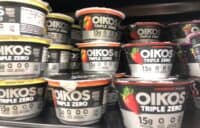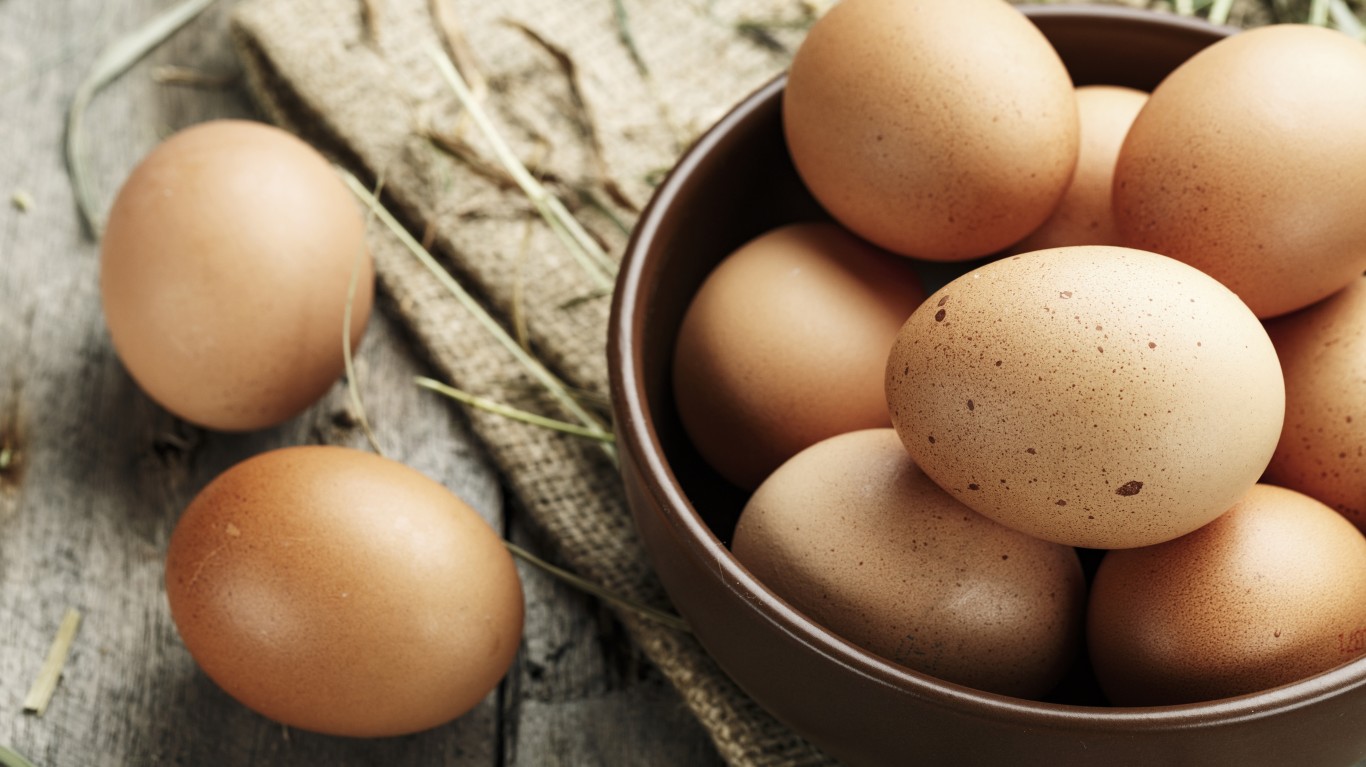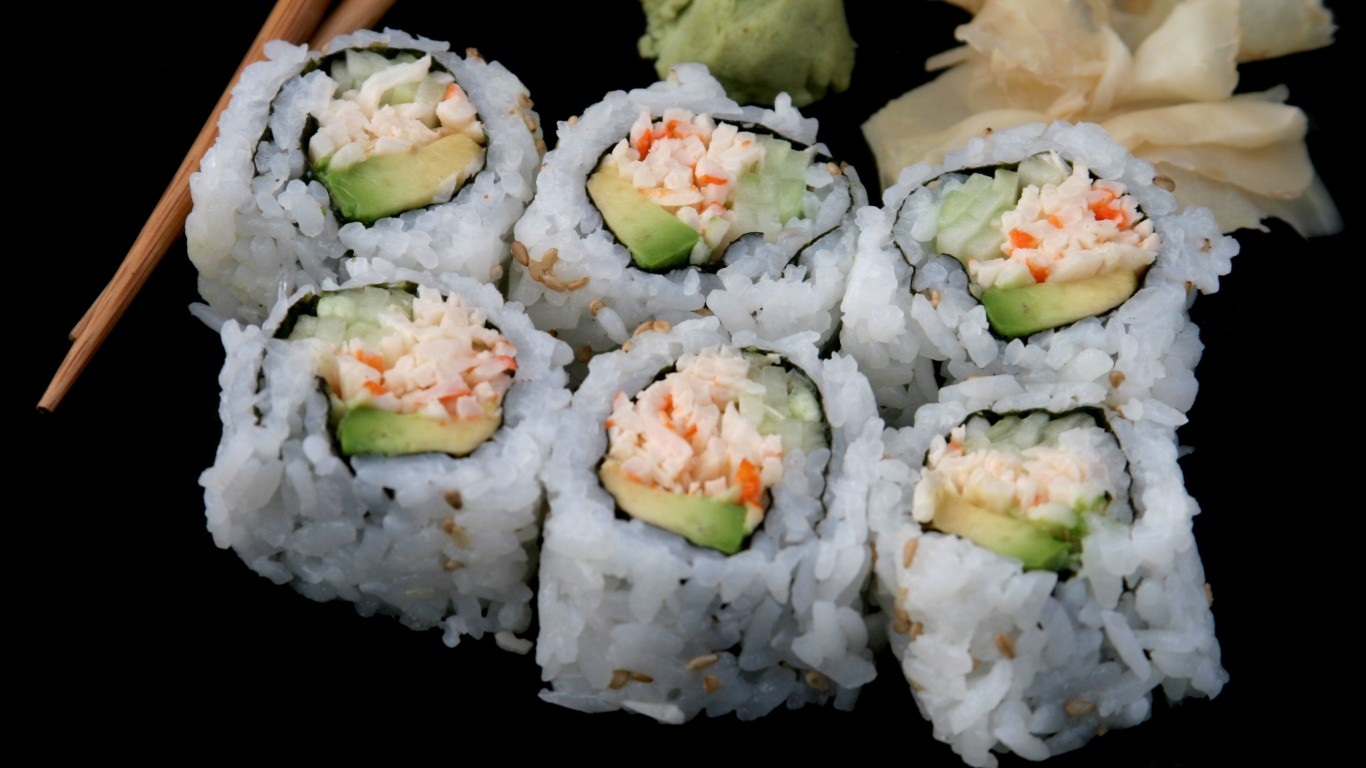
What makes a dish truly iconic in America? Does it just need to be popular nationwide? Does it require a long history? Or does it need to exemplify how we as a nation dine and have dined? In our view, the most iconic foods check all these boxes.
Travel the country and you’ll see every state has its own iconic foods, like King Crab legs in Alaska, deep dish pizza in Illinois, and Hoosier sugar cream pie in Indiana. Some have gone national, but many remain local gems. Each state has culinary icons. Here’s more about the most iconic foods in every state.
Like state foods, many cities also have signature dishes. Cincinnati is known for spaghetti with meat sauce and cheese, Cleveland for kielbasa, coleslaw, fries, and barbecue sauce on a bun, and Milwaukee for fried cheese curds. These are signature dishes from 50 American cities.
Many iconic American foods started as regional specialties. Some origins are debated, some came from inspiration, and many began as “foreign” dishes now considered standard American fare, reflecting our melting pot.
Regardless of origin, these foods have become quintessential, indelible parts of American culinary culture we simply can’t imagine life without.
Click here to see a list of America’s most iconic dishes
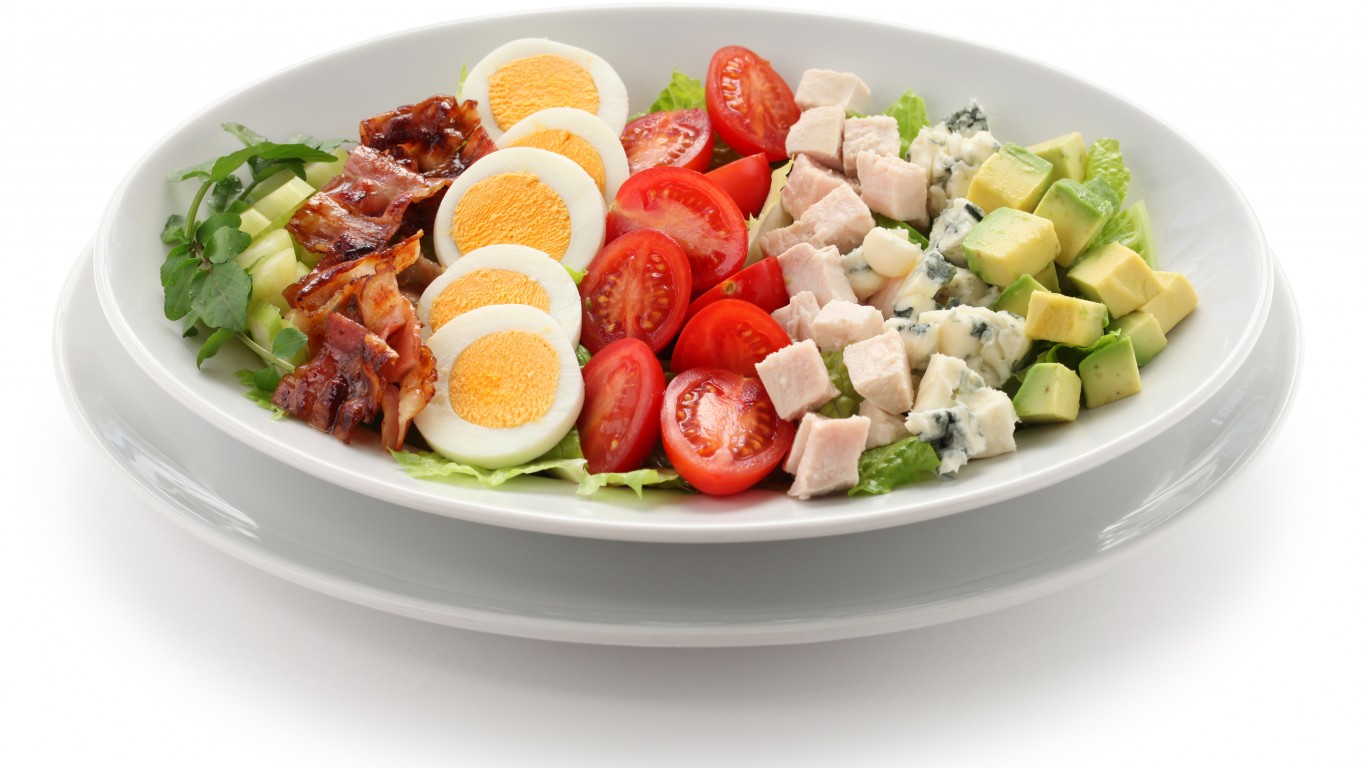
1. Cobb salad
The signature dish at Hollywood’s legendary Brown Derby restaurant, the Cobb Salad is named after the restaurant’s co-owner, Robert Cobb, who invented it in 1937. In its most classic form, it’s made with chopped salad greens, tomato, bacon, blue cheese, chicken breast, hard-boiled egg, and avocado with a vinaigrette dressing. The ingredients were originally tossed together, but now they are typically served neatly arranged in rows. And best of all, because it’s a salad you’re free to claim that it’s healthy.
[in-text-ad]

2. Shrimp cocktail
Is a steakhouse meal a steakhouse meal if it doesn’t start with shrimp cocktail? This classic appetizer (which is also extremely popular in the UK, where it’s called prawn cocktail) starts, of course, with shrimp, which is poached and chilled. It’s served alongside cocktail sauce, which at its simplest is a mixture of ketchup and horseradish, but also usually includes Worcestershire sauce, hot sauce, and vinegar. A squeeze of lemon completes the dish.
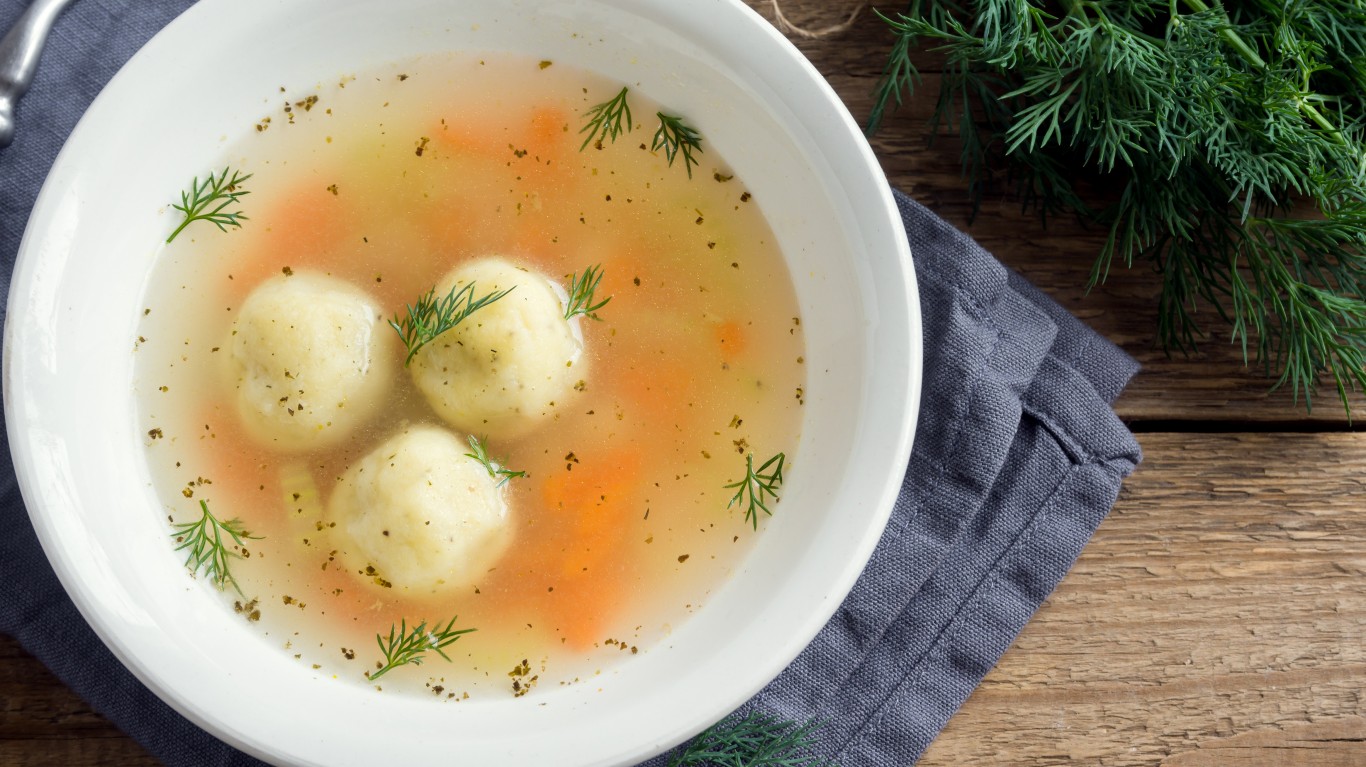
3. Matzo ball soup
A Jewish deli staple, matzo ball soup has gone from being a traditional Passover dish to one that can be found at delis and diners across the country. Matzo balls (called kneidlach in Yiddish) are made with a combination of matzo meal (ground up matzo), eggs, water, and fat (usually oil or chicken fat). They’re formed into balls and boiled like dumplings in chicken soup. The soup itself can contain just the matzo balls or noodles and chicken. It’s simple, filling, and delicious.
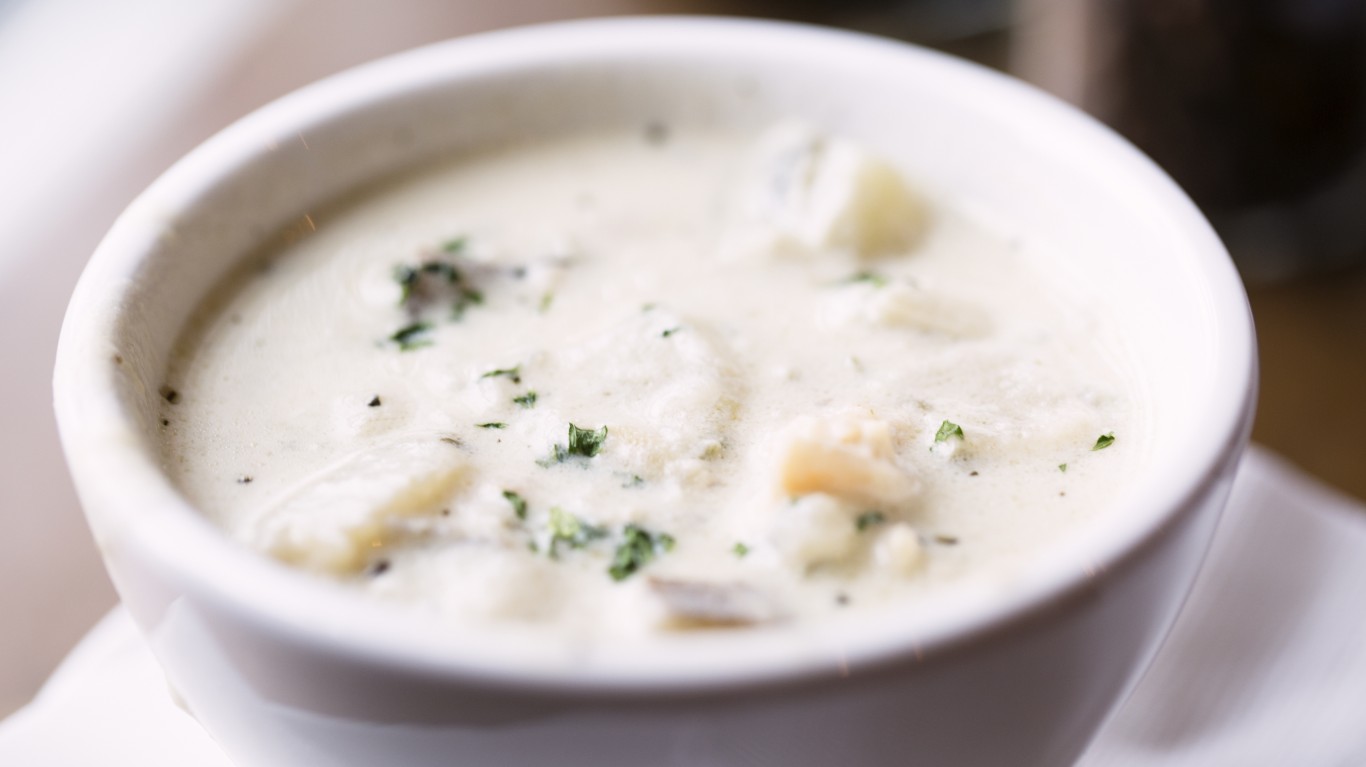
4. Clam chowder
Clam chowder originated in the Northeast, but today it’s beloved from coast to coast. There are a few varieties of clam chowder: Manhattan clam chowder, which is tomato-based (and, oddly enough, isn’t especially common in Manhattan); the far more popular New England clam chowder, which is thick, creamy, and milk- or cream-based, usually also containing potatoes and salt pork; Rhode Island (a clear broth with no dairy or tomatoes); and Long Island (a combination of Manhattan and New England).
[in-text-ad-2]
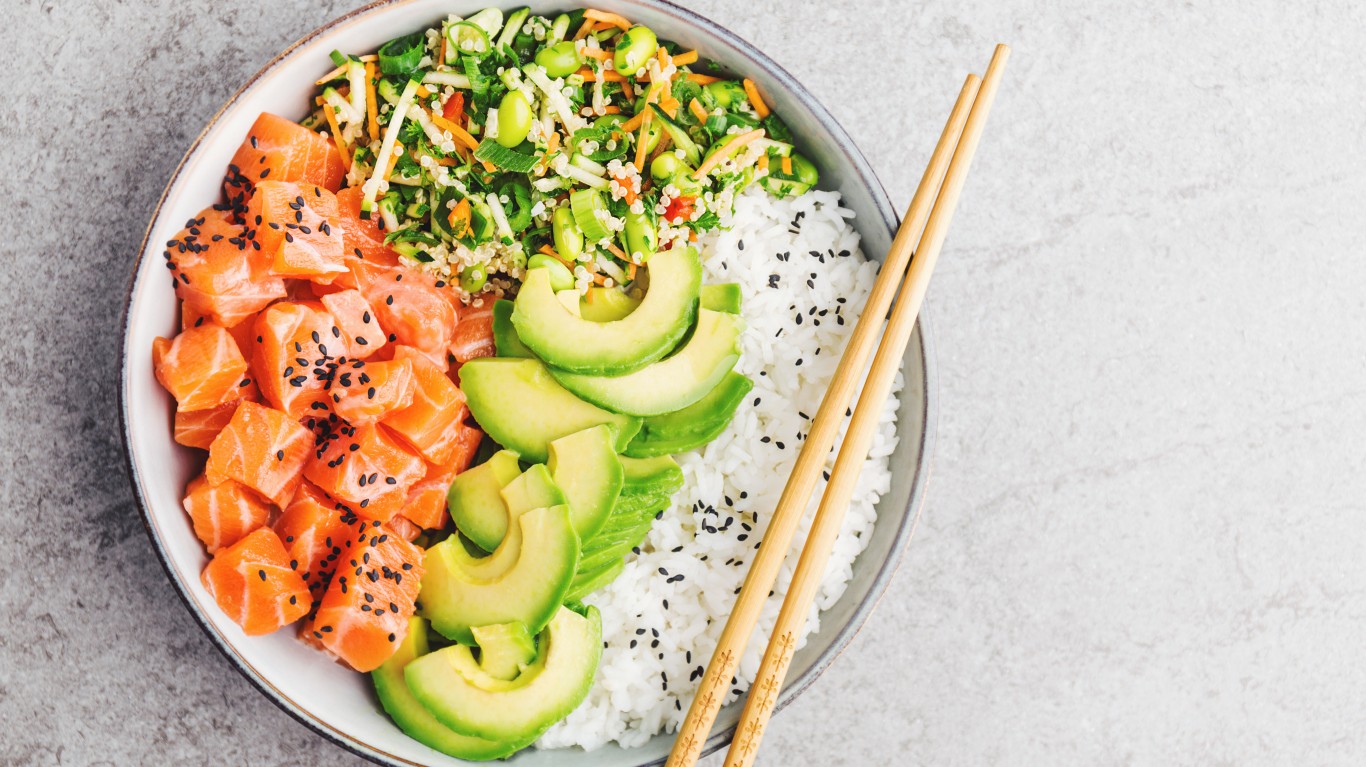
5. Poke
It wasn’t too long ago when poke (pronounced PO-kay) was almost unheard-of outside of Hawaii, but thanks to its versatility, the wide availability of super-fresh fish, healthfulness, and downright deliciousness, it has taken off over the past decade as a fast-casual go-to. Poke started as a snack for Hawaiian fishermen, and at its most traditional it combines diced fresh raw fish (usually ahi tuna but also salmon, octopus, shellfish, or other fish) with salt, toasted ground candlenuts, seaweed, and soy sauce; other add-ins can include avocado, ponzu, jalapeño, sriracha, and cucumber.
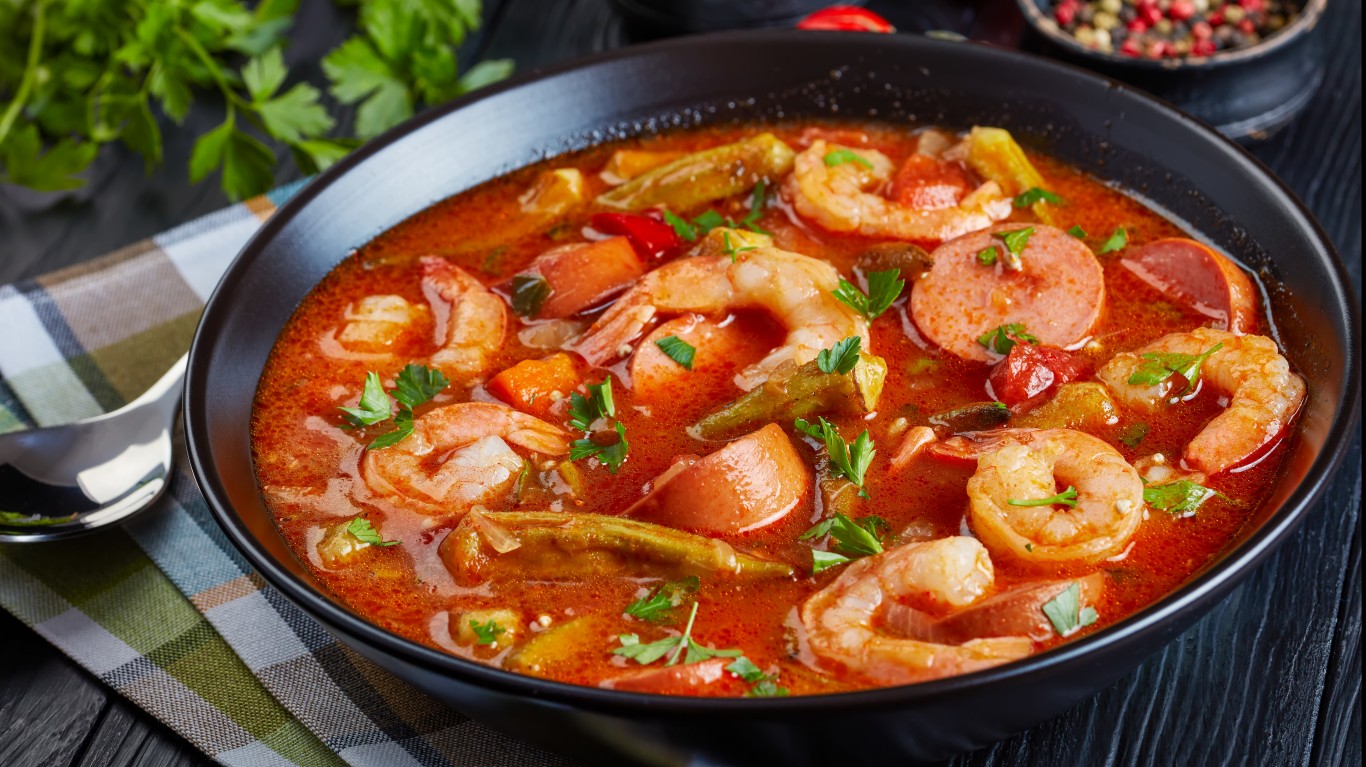
6. Gumbo
The official “state cuisine” of Louisiana, gumbo is a rich and hearty stew. Just about every chef and home cook has a recipe for it, but it generally starts with a dark roux, to which vegetables including the “holy trinity” (onions, bell pepper, and celery) are added, followed by meats and/or seafood and stock. Some choose to add tomatoes, and some thicken theirs up with either okra or filé powder, which is derived from sassafras. It’s a comforting umami-bomb, usually served over white rice.
[in-text-ad]
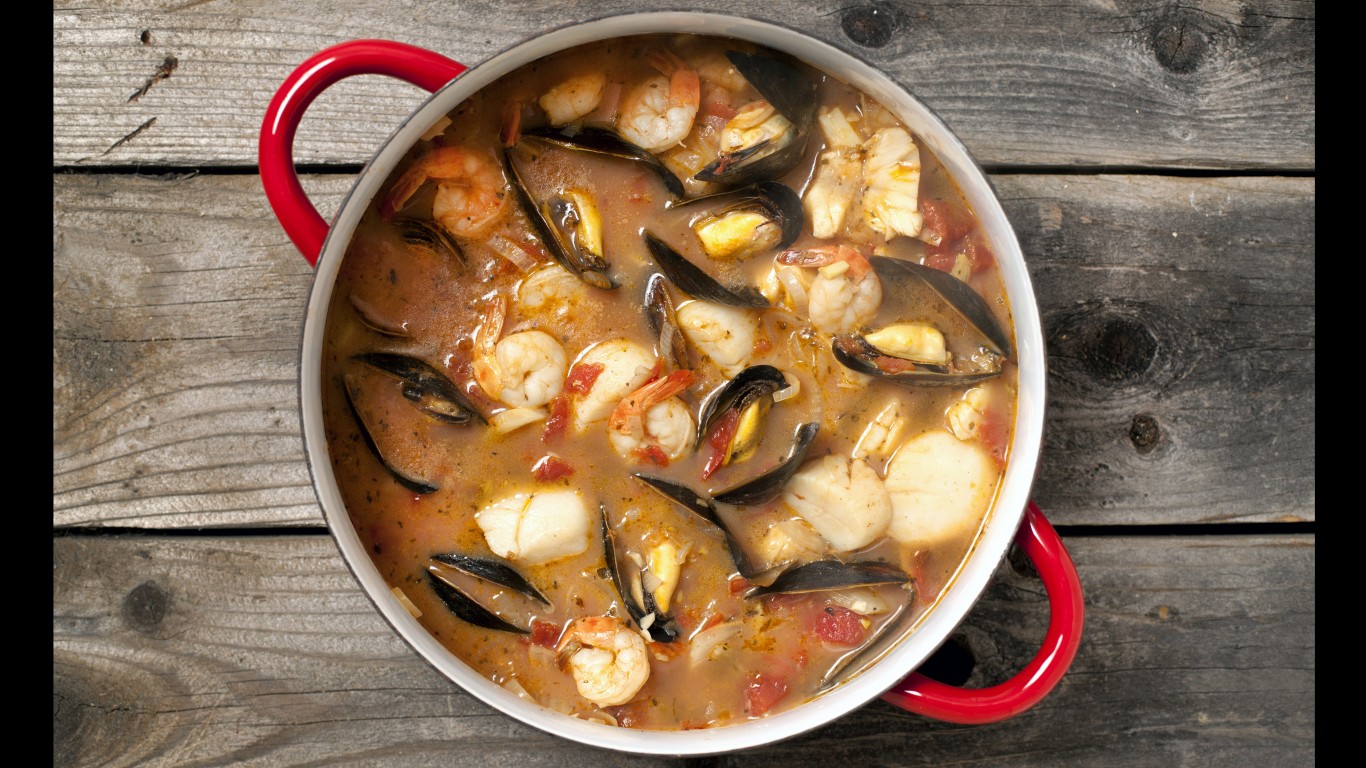
7. Cioppino
Even though its name might sound Italian, the fish stew called cioppino was actually invented in San Francisco by Italian fishermen in the late 1800s. It’s since become one of the hallmarks of the city’s cuisine, and a perfect vehicle for the bountiful seafood that’s pulled from surrounding waters. The main component is whatever the catch of the day is, usually a combination of fish, shrimp, clams, Dungeness crab, scallops, squid, and/or mussels. They’re simmered in a broth of tomato, white wine, and seafood stock, and it’s all served in a big bowl with a hunk of the city’s signature sourdough.
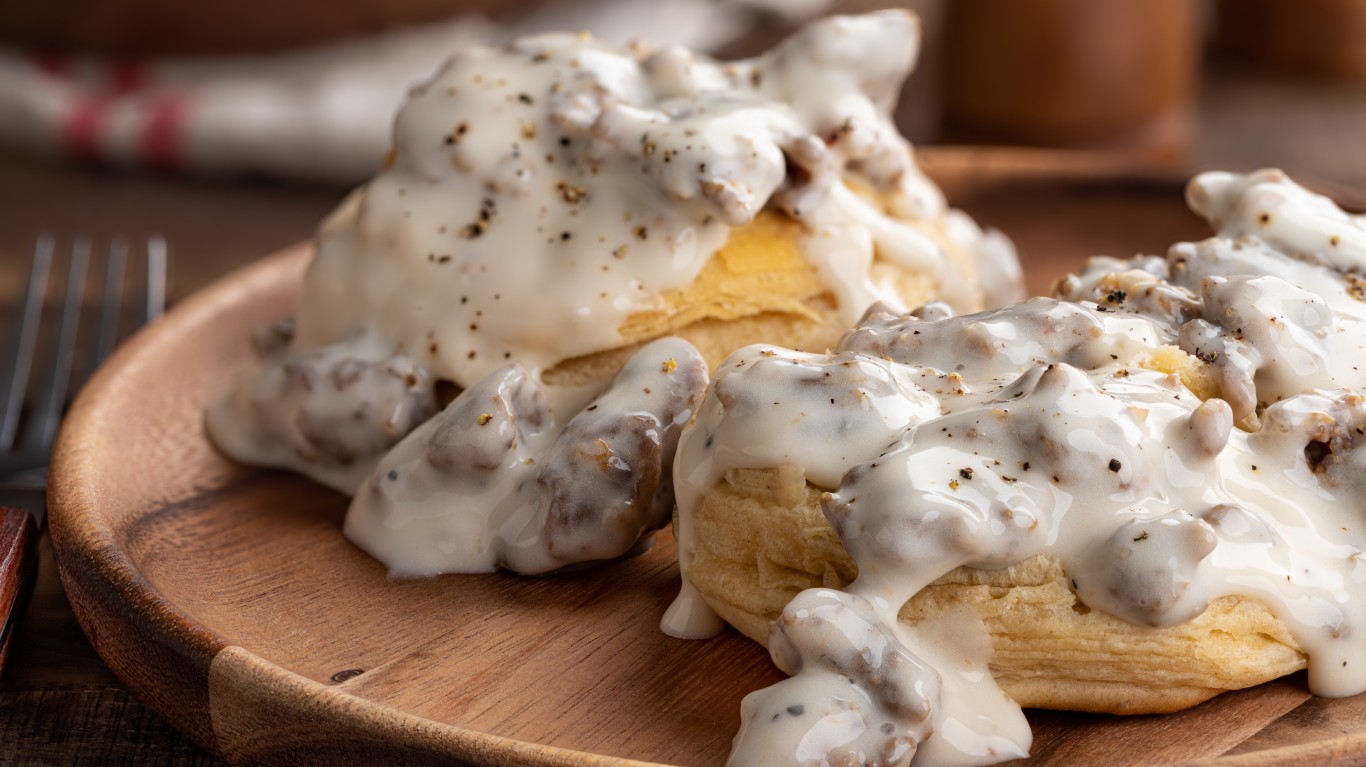
8. Biscuits and gravy
A hearty breakfast dish and a staple at casual restaurants across the South, biscuits and gravy are a match made in heaven. It’s simply a soft biscuit topped with a ladle or two of creamy gravy. The gravy is usually made with drippings from the frying of pork sausage and thickened with milk (many versions also include chunks of sausage), and is usually seasoned with plenty of black pepper. If you find yourself at a homespun Southern restaurant and you see this on the menu, order it.

9. Eggs Benedict
Whether invented at Delmonico’s or the Waldorf (both NYC institutions claim to have originated the dish in the late 1800s), eggs Benedict remains quite possibly the perfect brunch dish. It’s made by topping two halves of a toasted English muffin (originally a round of rusk) with Canadian bacon, poached eggs, and hollandaise sauce, and it’s elegant and indulgent at the same time. Variations are limitless (eggs Florentine swaps the Canadian bacon for sautéed spinach; other versions replace it with smoked salmon or lobster).
[in-text-ad-2]
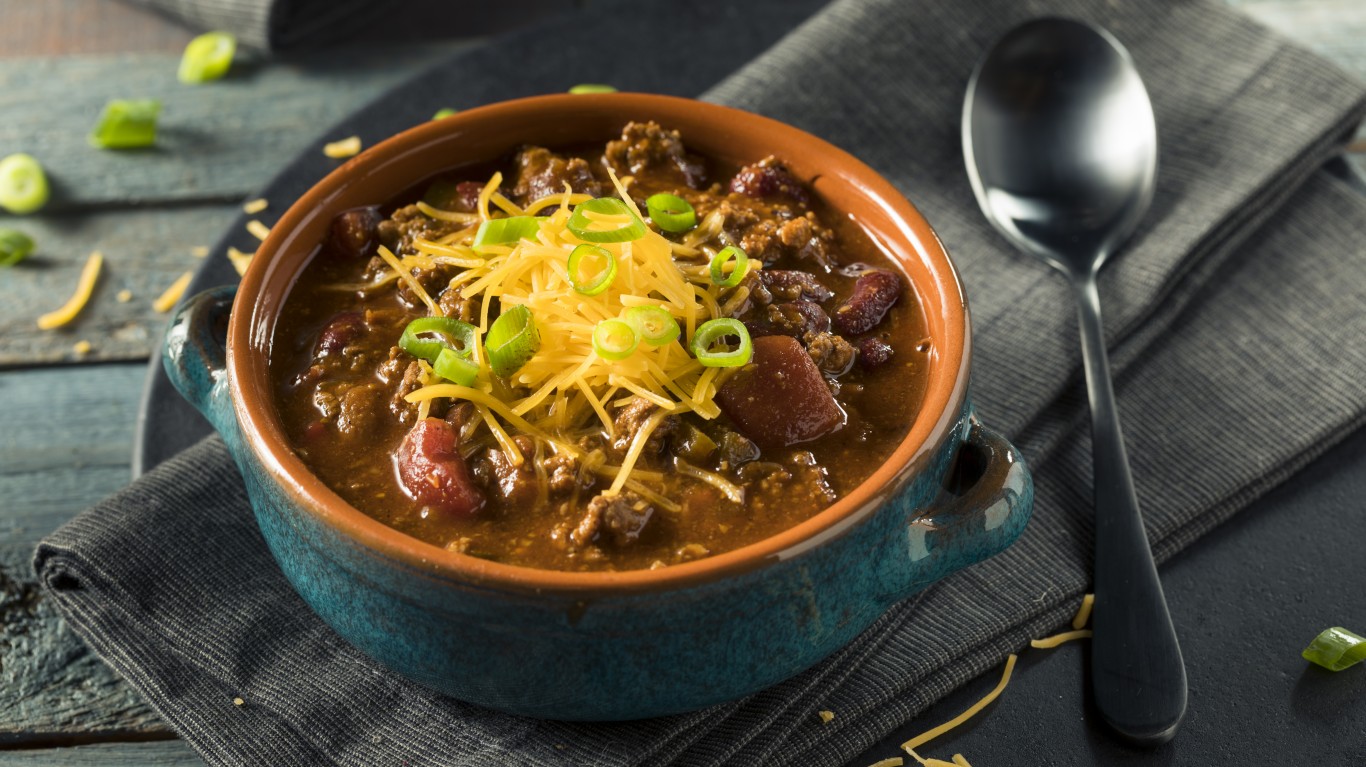
10. Chili con carne
The official dish of the state of Texas, chili con carne is a hearty stew that, at its simplest, is slow-cooked chunks of beef in a thick sauce made with dried chiles or chili powder. That’s the most traditional way of making it in Texas (where it’s lovingly referred to as a “bowl of red”), but most of the chilis you’ll find outside of the Lone Star State also include beans, tomatoes, garlic, onions, and cumin, and are made with ground beef. It’s easy to make and so customizable that many home cooks have their own recipes; some enter them in annual chili cook offs to compete for the crown.

11. Jambalaya
A Creole and Cajun dish with French, African, and Spanish roots, jambalaya is one of the most commonly found dishes in New Orleans, and is a thing of great pride for high-end chefs and home cooks alike. To make classic Creole jambalaya, rice is slowly cooked with vegetables including tomatoes, garlic, onions, bell pepper, and celery, as well as sausage, chicken, and sometimes seafood including shrimp and crawfish. Jambalaya in New Orleans usually includes tomatoes, but in southwestern and south-central Louisiana, Cajun-style jambalaya doesn’t.
[in-text-ad]
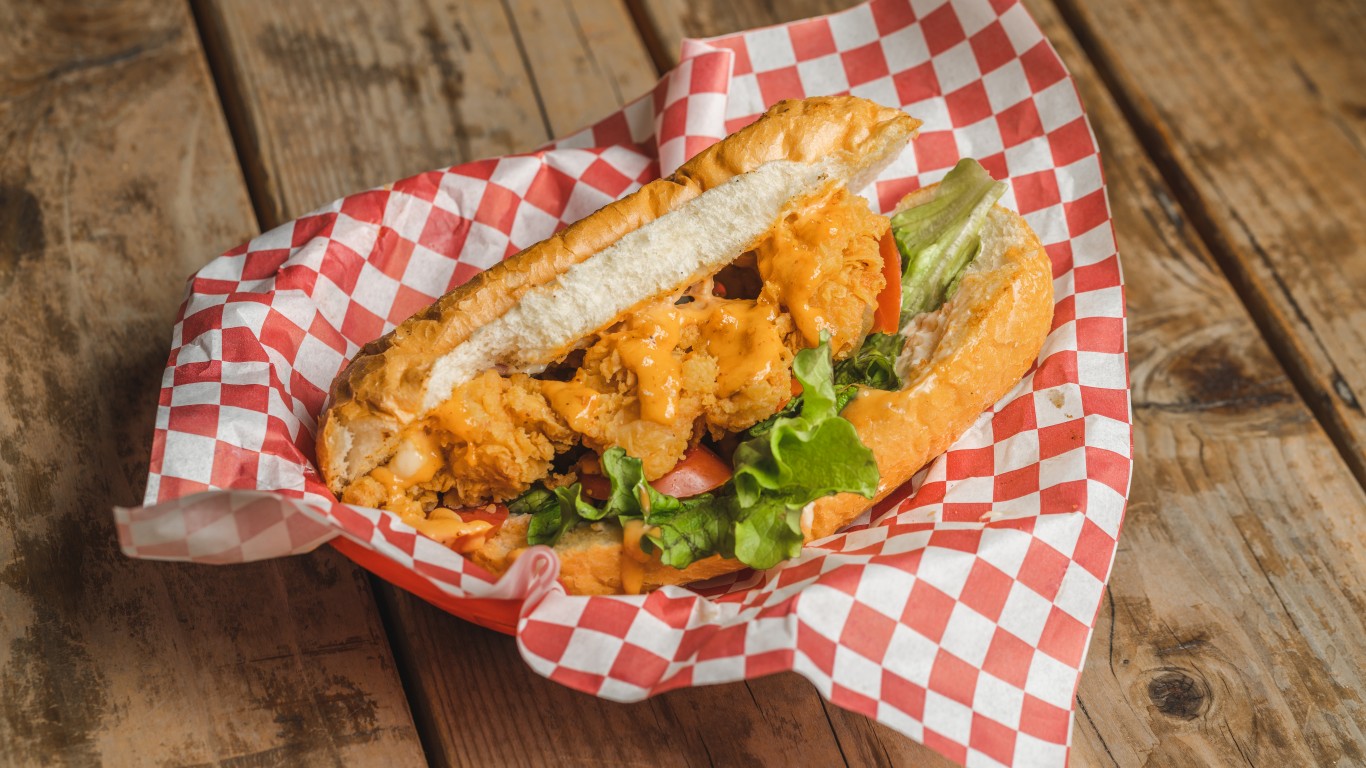
12. Po’boy
The po’boy is a signature food of New Orleans. As the story goes, back in 1929, during a four-month strike against the city’s streetcar company, husband and wife Benny and Clovis Martin fed the strikers free sandwiches at their French Market restaurant; the term was coined when they referred to the strikers as “poor boys” coming in to eat. Nowadays, the po’boy can be found at countless restaurants and sandwich shops throughout the Big Easy. It always starts with a soft, crusty loaf of French bread (ideally from local bakery Leidenheimer’s), and there are countless filling options, from fried shrimp, crawfish, and oysters to roast beef, ham, and sausage. Order it “dressed” and it’ll come topped with lettuce, tomato, pickles, and mayo.
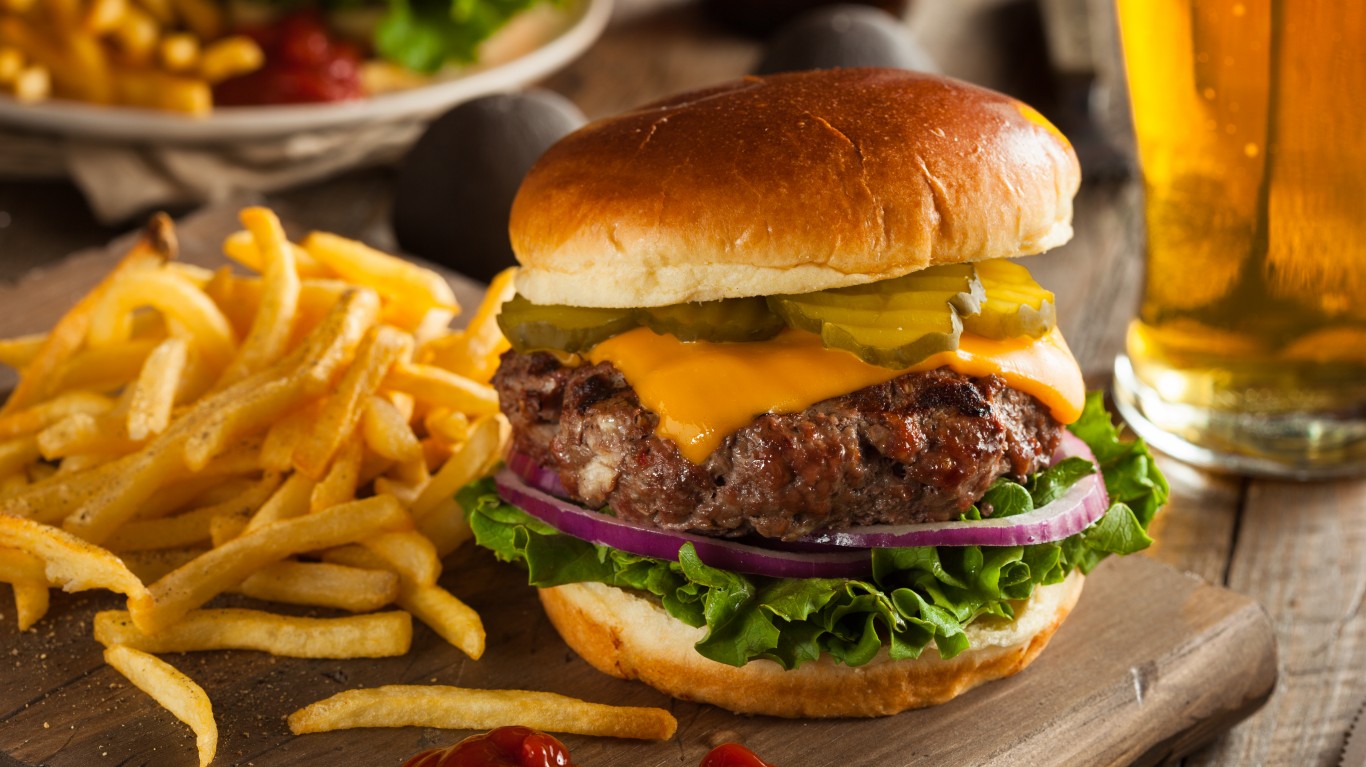
13. Cheeseburger
Cheeseburger, anyone? Unadorned hamburgers are well and good, but let’s be honest: it’s not a burger unless it’s a cheeseburger. It’s hard to imagine, but it wasn’t until the late 1920s that the cheeseburger was invented; a 16-year-old cook named Lionel Sternberger reportedly created it in 1926 at his father’s restaurant in Pasadena. But nowadays, the cheeseburger is as American as apple pie. And whether it’s American cheese, blue cheese, cheddar, or pepper Jack, there’s nothing quite like the flavor of melted cheese on top of a griddled beef patty.
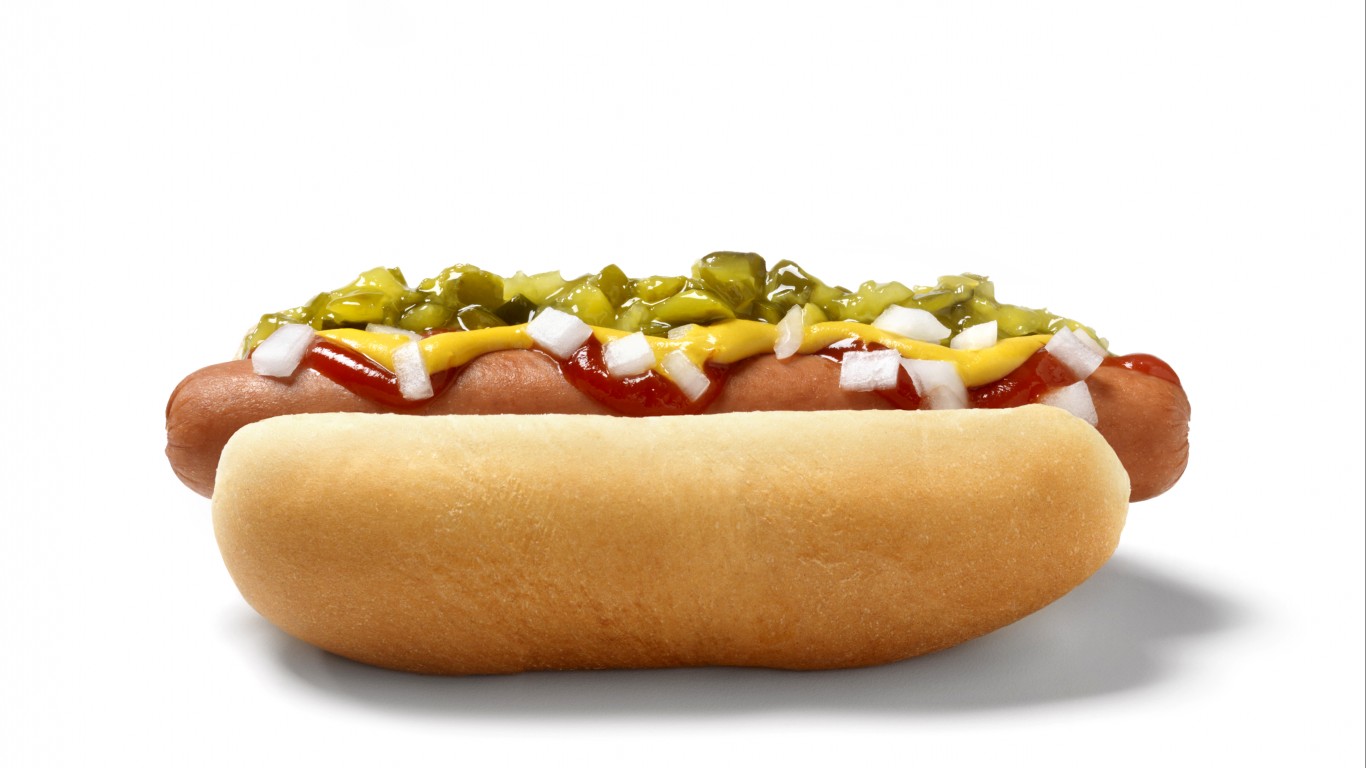
14. Hot dog
How do you like your hot dog? Perhaps you go New York-style with some sauerkraut and a swipe of deli mustard? Or maybe you want a beefy chili sauce and onions, Michigan coney-style? How about “dragged through the garden,” Chicago-style? One of the great things about a hot dog is that it’s infinitely customizable; you start with a frank on a bun and take it from there. Popularized in Coney Island in the late 1800s (where someone had the brilliant idea to take a German sausage and make it handheld by putting it in a bun), the hot dog is the quintessential working man’s food. A great hot dog is simple and classic, and we can’t get enough of ’em.
[in-text-ad-2]
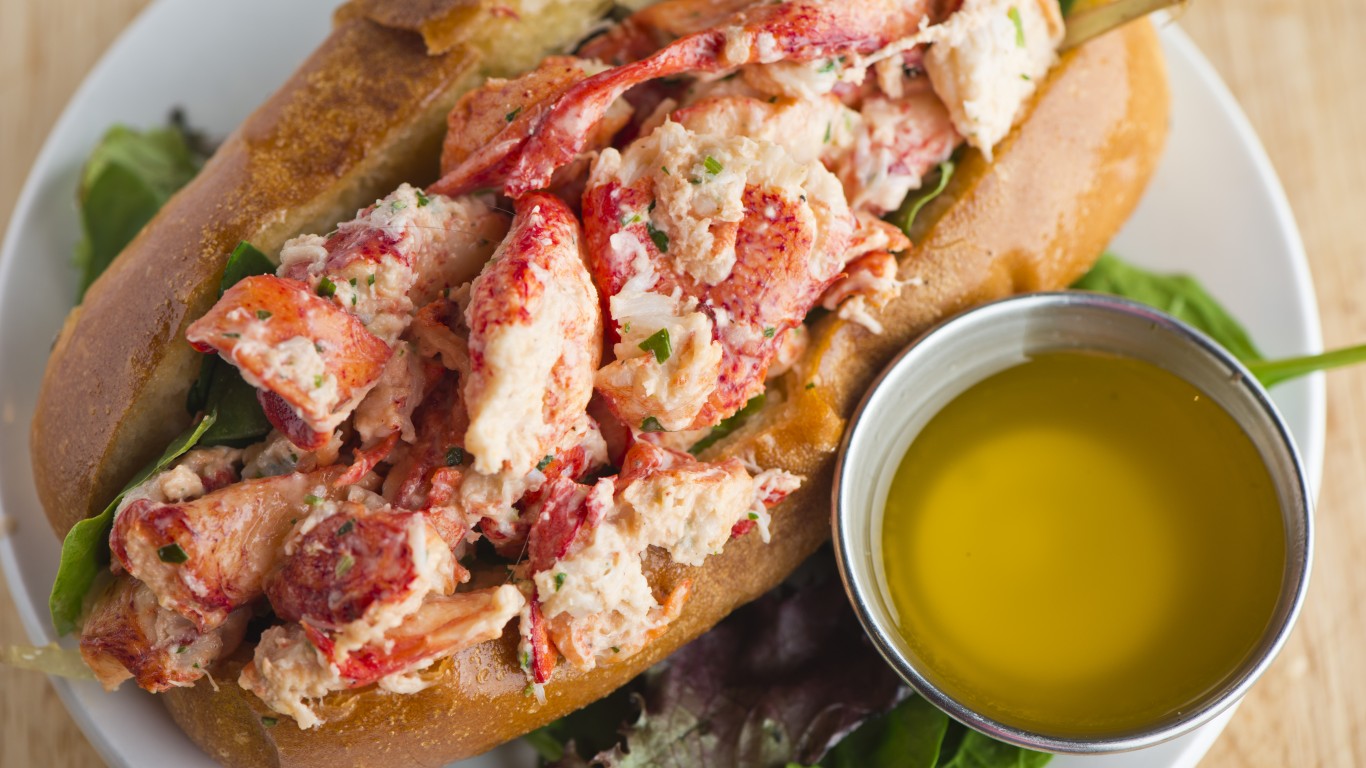
15. Lobster roll
The lobster roll is one of the hallmarks of Northeastern cuisine. It usually comes in two primary versions: Maine-style, in which the lobster is cold and tossed with mayo; and Connecticut- or Rhode Island-style, which is served warm with butter. Both tuck the lobster meat into a split-top hot dog bun (or sometimes a round burger bun in Connecticut), which is usually griddled with butter. It’s not cheap and some have argued that turning a delicacy as expensive as a lobster into a sandwich is below its station, but if you ever find yourself sitting on the rocky shores of Maine with a fresh lobster roll in your hand, it’s truly like biting into a little piece of heaven.
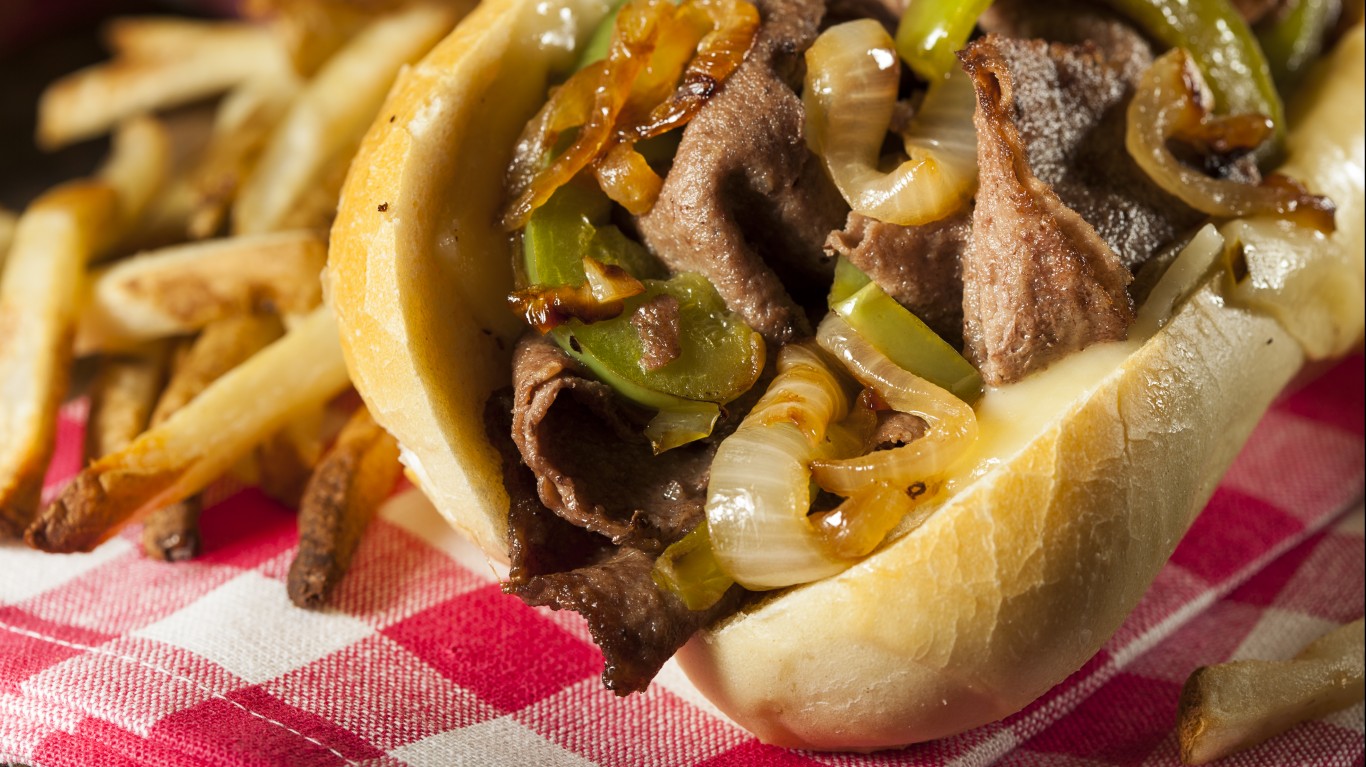
16. Philly cheesesteak
If you visit Philly without eating a cheesesteak, You’re really missing out. A delicious gutbuster of a sandwich, the Philly cheesesteak was reportedly invented by Pat and Harry Olivieri back in the early 1930s (Pat’s remains the city’s most famous cheesesteak shop, along with Geno’s across the street). It’s a cheesy, greasy mashup of thin-sliced griddled beef, cheese (usually American, provolone, or Cheez Whiz), and chopped onions all piled into a long hoagie roll, and it’s wildly delicious.
[in-text-ad]
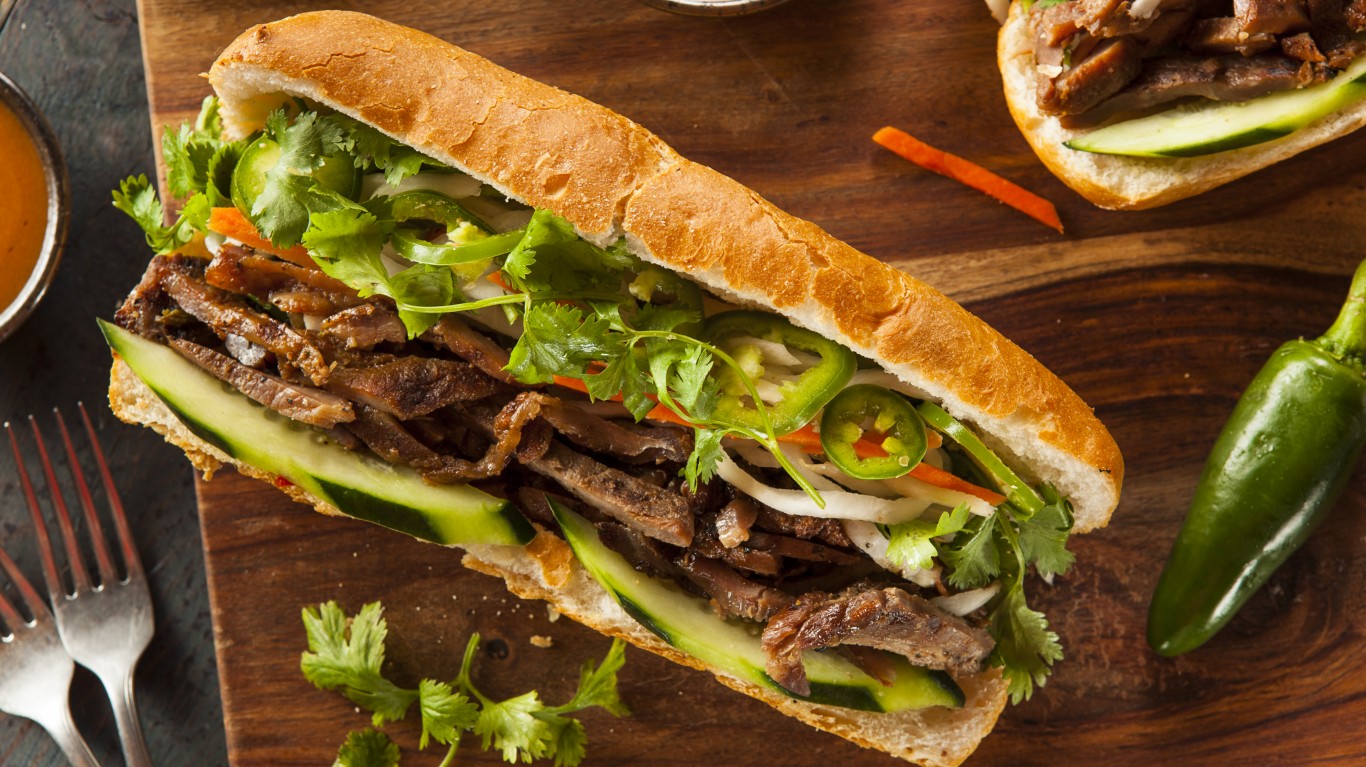
17. Banh mi
Brought over to the United States by Vietnamese immigrants, the bánh mì is a perfect example of the influence of French imperialism in the country’s foods. It starts with a small Vietnamese baguette (which has a thinner crust and a more airy crumb than its French counterpart), and a classically filled with meats that might include ham, shredded pork, meatballs, pâté, or grilled chicken along with fresh cilantro, shredded pickled carrot and radish, and condiments including hot sauce and mayo. Most bánh mì shops offer at least 10 options for the filling.
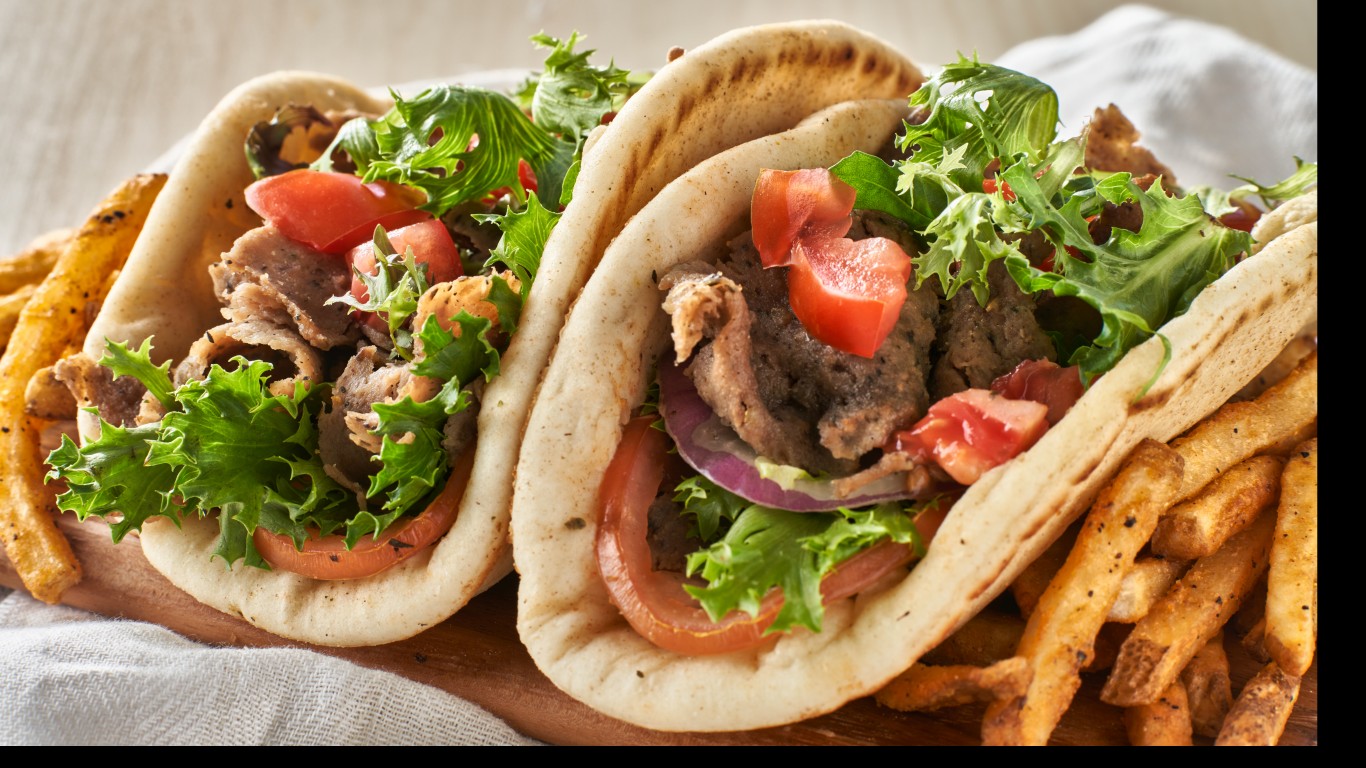
18. Gyro
The gyro might be Greece’s best-known contribution to America’s culinary world. In Greece, it usually refers to any type of meat that’s cooked on a vertical spit, sliced, and tucked into a pita, but in the US that meat usually tends to be a large, dense loaf of (usually) lamb along with herbs and spices that’s cut into thin slices after being browned on the spit, accompanied by lettuce, onion, tomato, tzatziki sauce, and sometimes French fries in a rolled-up pita. You also might also see it referred to as doner kebab, otis Turkish name.

19. California roll
Ask any sushi lover what their “gateway roll” was, and most likely they’ll tell you it was the California roll. In fact, the California roll wasn’t just influential in turning Americans on to sushi, it also helped usher in Asian fusion cuisine as we know it. Its origins remain murky, but by 1980 it had caught on in popularity so much in California that it was featured in Gourmet, and from there it became popular on a national scale. To make a classic California roll, avocado, crab (or, more frequently, imitation crab called surimi), and cucumber are rolled up “inside-out” with seaweed and sushi rice.
[in-text-ad-2]
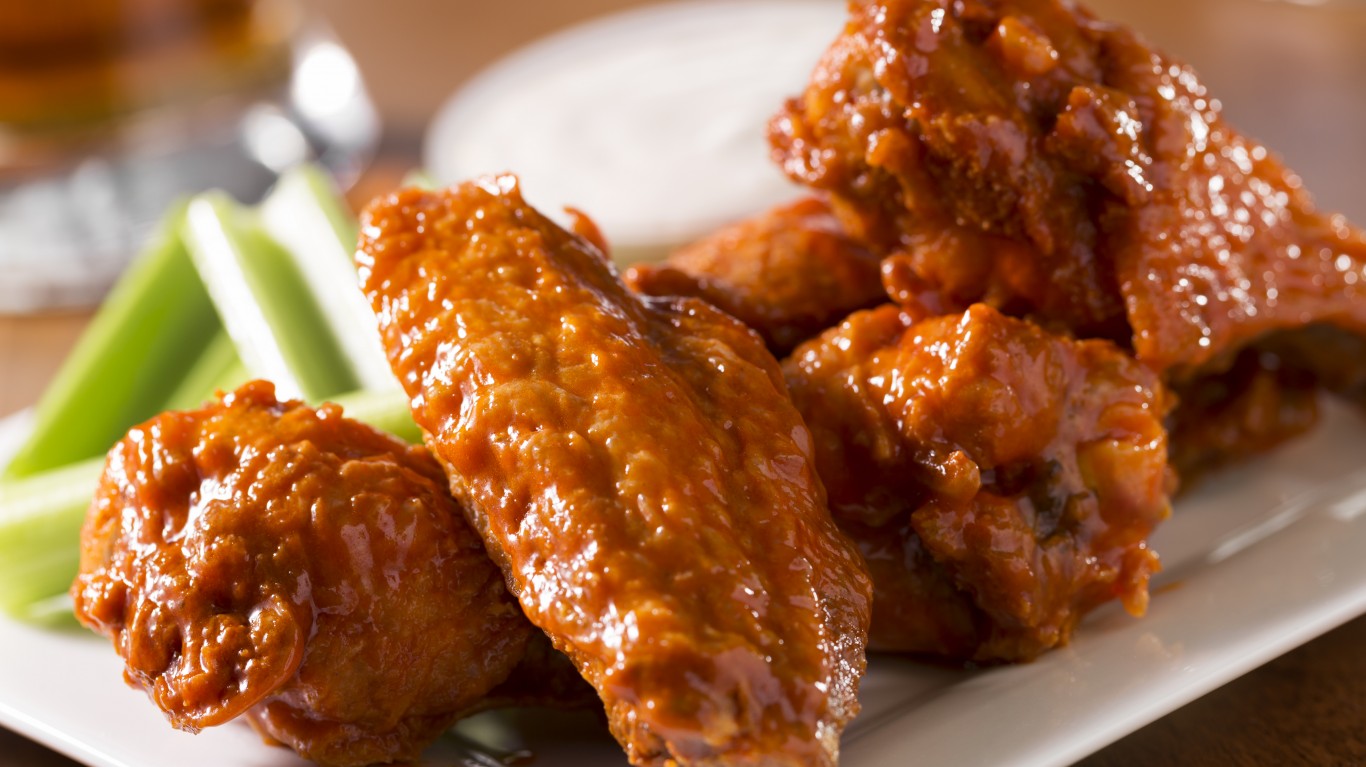
20. Buffalo wings
No game day is complete without a platter of hot, crispy Buffalo wings, doused in a tangy, spicy sauce. It’s hard to believe that before Buffalo wings were invented by Teresa Bellissimo at her Anchor Bar in Buffalo, back in 1964, wings were usually just thrown out or used for stock. But by deep-frying them and tossing them in a mixture of Frank’s hot sauce and butter, she struck gold, and an icon was born. Buffalo wings remain a Buffalo fixture to this day, where countless bars and restaurants (most notably Anchor Bar) serve them to millions of hungry patrons annually.
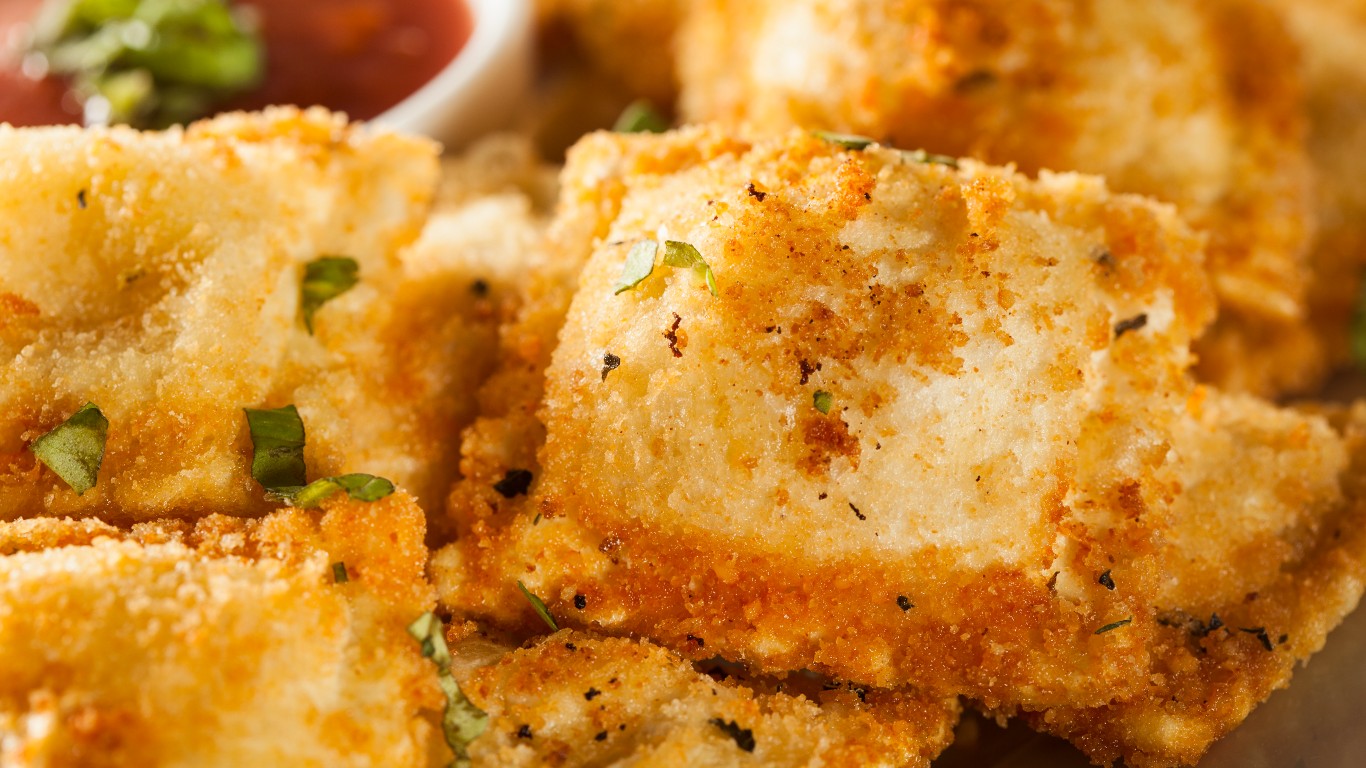
21. Toasted ravioli
If you happen to find yourself in the St. Louis Little Italy neighborhood called “The Hill,” you owe it to yourself to track down the city’s signature snack, toasted ravioli. Invented at one of the neighborhood’s renowned Italian restaurants (Charlie Gitto’s, Mama Campisi’s, and Lombardo’s all take credit for it), “t-ravs” are made by dredging square, meat-filled ravioli in egg and breadcrumbs and deep-frying them until golden brown. Parmesan cheese is sprinkled on top, and they’re served alongside marinara sauce for dipping. It’s one of the greatest snacks known to man, and we’re honestly a little surprised we don’t see them on menus outside of St. Louis more often.
[in-text-ad]
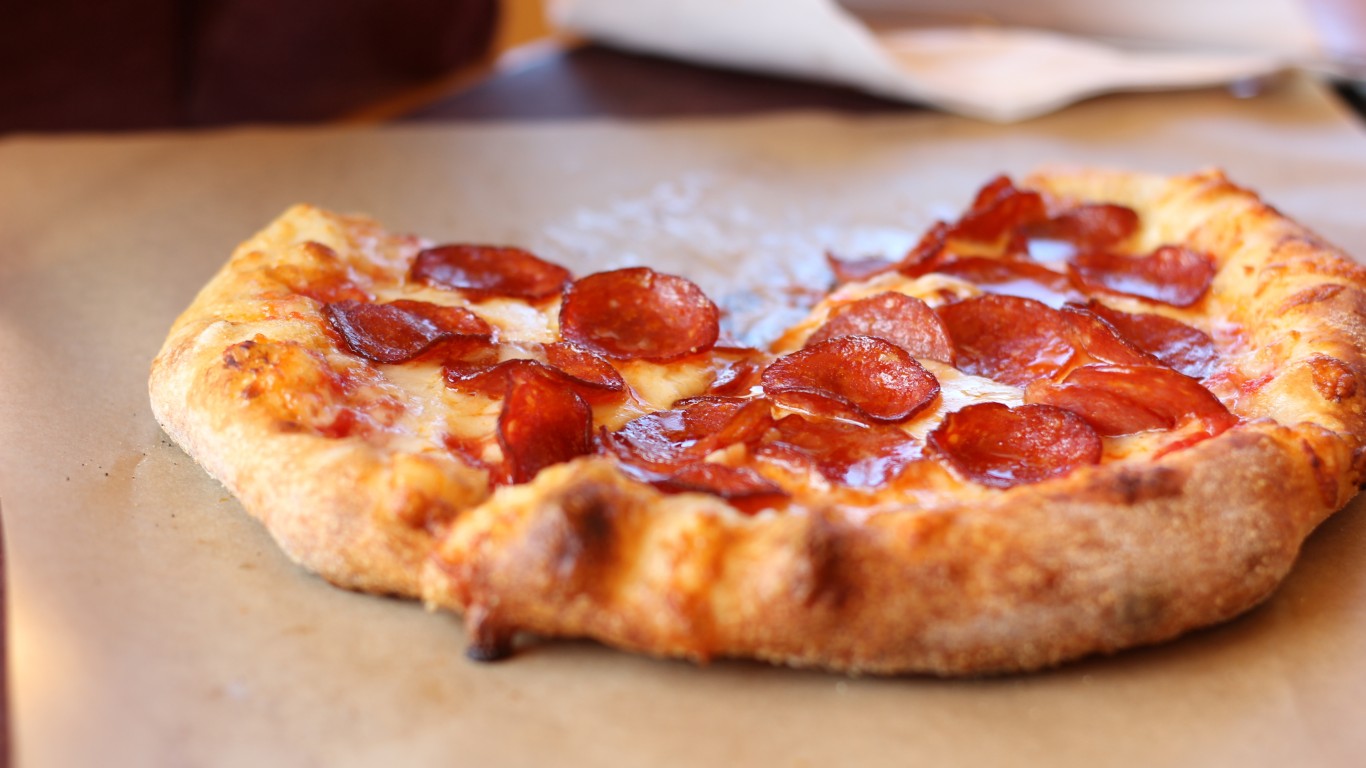
22. Pepperoni pizza
Just like the magic that happens when cheese is melted atop a burger patty, there’s a certain alchemy that’s achieved when a plain slice of pizza is anointed with pepperoni. As the pepperoni heats up in the oven, deliciously spicy oil seeps out of the salami onto the cheese (or, if it’s the curly pepperoni that everyone loves these days, into a self-contained little cup), and it somehow makes a perfect food even more perfect. The true test of a great pizzeria might be how great its plain slice is, but we’re ordering pepperoni every time.
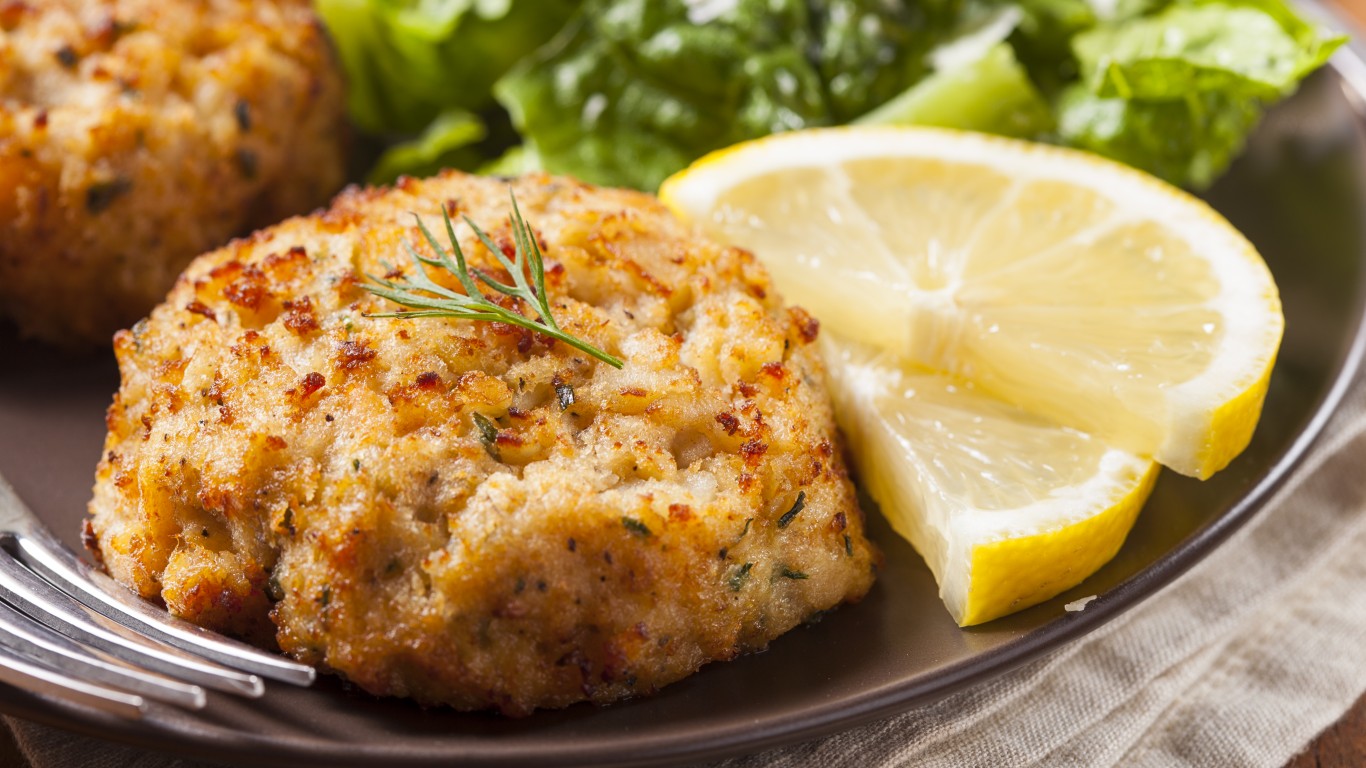
23. Crab cakes
Most of the country might know crab cakes as a pricey steakhouse appetizer, but in the Mid-Atlantic, especially around Baltimore, they’re a way of life â and they’re also popular along the Gulf coast and in the Pacific Northwest, and other places where crabs are abundant. The quintessential Maryland crab cake is made with blue crab and just enough mayo and breadcrumbs to hold it together, and it’s typically pan-fried. The best crab cakes make use of jumbo lump crabmeat. Crab cakes can vary widely based on individual recipes and the quality of the crab, but Chesapeake-area restaurants take great pride in making the best around.
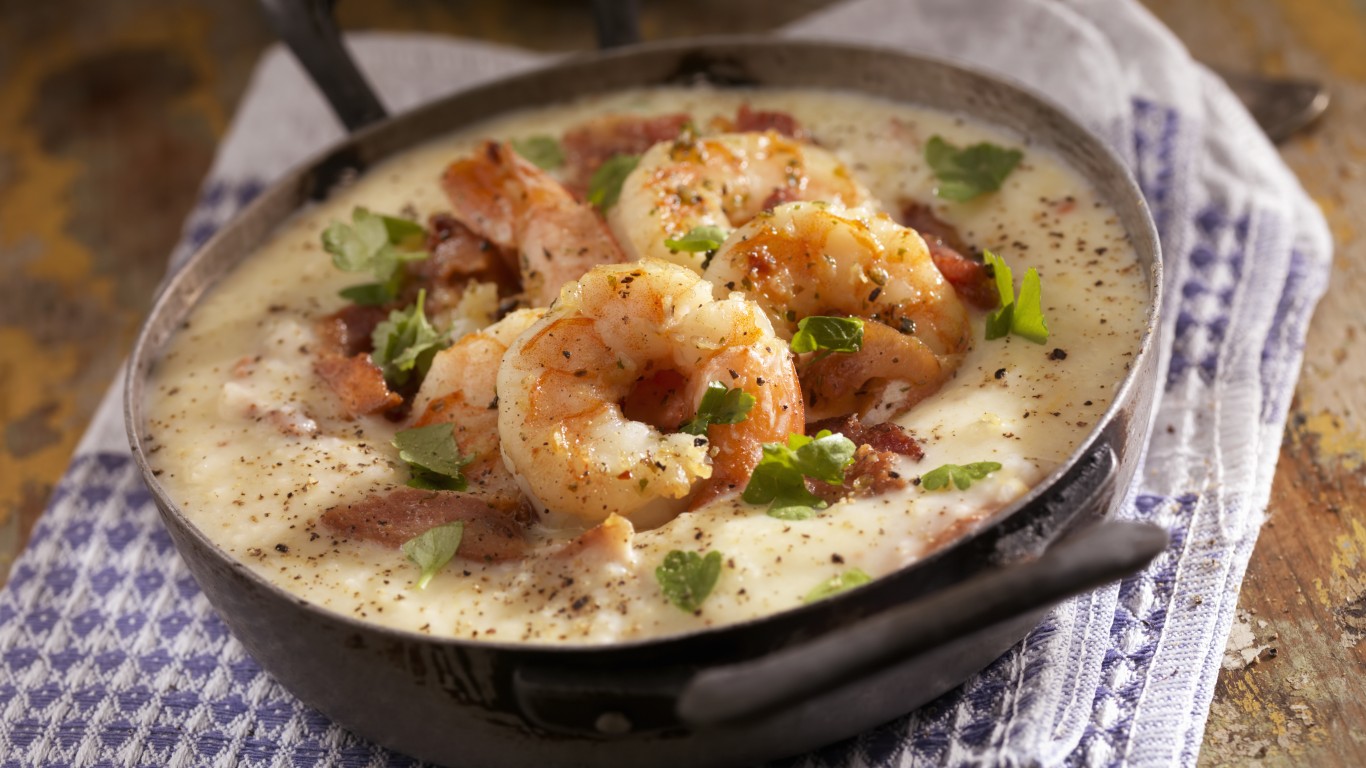
24. Shrimp and grits
Shrimp and grits is an essential Southern dish, and is especially popular in New Orleans and the Lowcountry of coastal Georgia and the Carolinas. It’s actually a traditional breakfast dish, even though it’s not uncommon to see it eaten all hours of the day. There’s no one right way to make shrimp and grits, but a couple parameters are a given: the shrimp need to be fresh and perfectly cooked, and the grits need to be creamy and buttery. Some chefs let the two ingredients speak on their own (with maybe some green onion as garnish), while others gild the lily with mushrooms, bacon, and a rich shrimp stock-based sauce.
[in-text-ad-2]
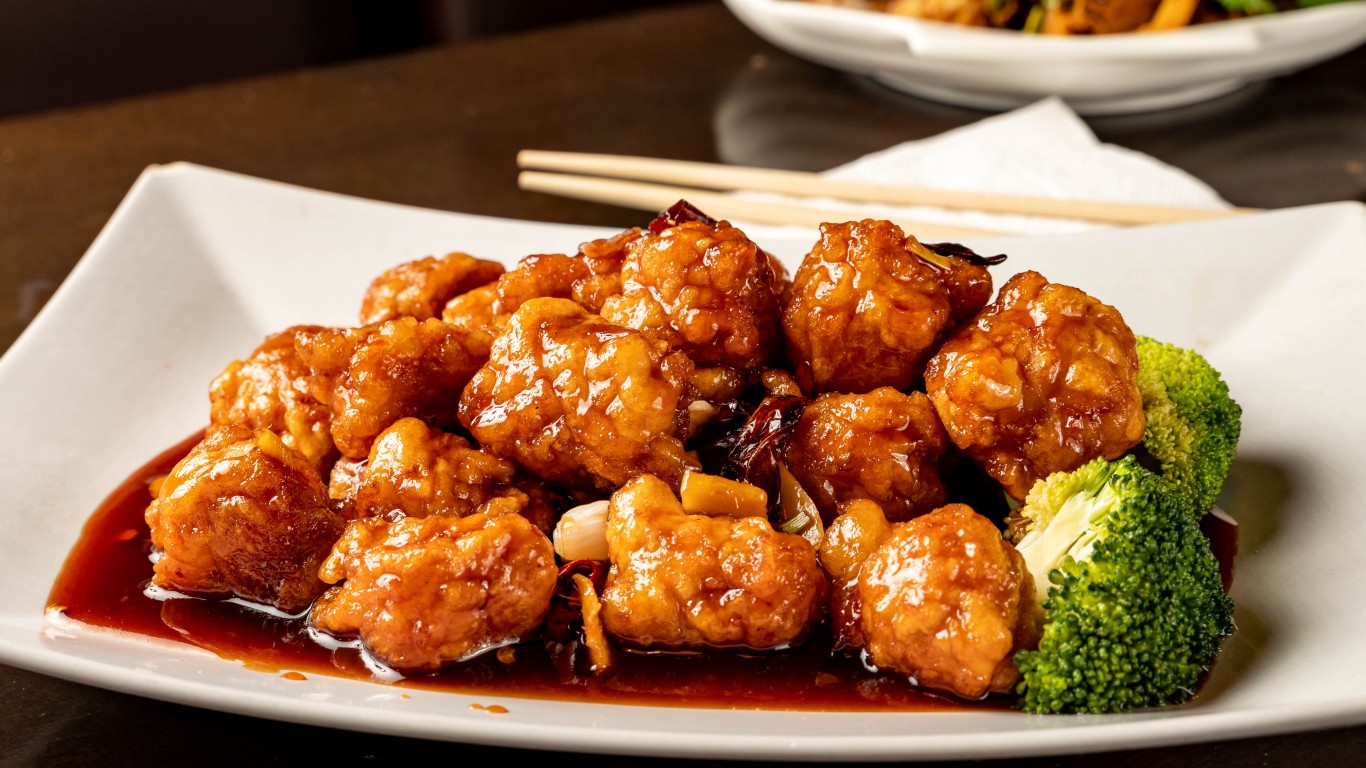
25. General Tso’s chicken
Who was General Tso, and why is there an iconic Chinese-American dish named after him? The first part is easy: it’s named after Zuo Zongtang, a Chinese military leader and statesman who lived from 1812 to 1885. As for the reason why the dish is named after him? Well, nobody really knows for certain; in fact, there was a whole documentary made about it, 2014’s “The Search for General Tso.” Regardless, we do know that the dish first appeared in New York City in the 1970s, and it’s made by battering and frying chunks of dark meat chicken and tossing it in a sweet and slightly spicy sauce. And if your local Chinese takeout doesn’t make a good version of it, you should probably find a new one.
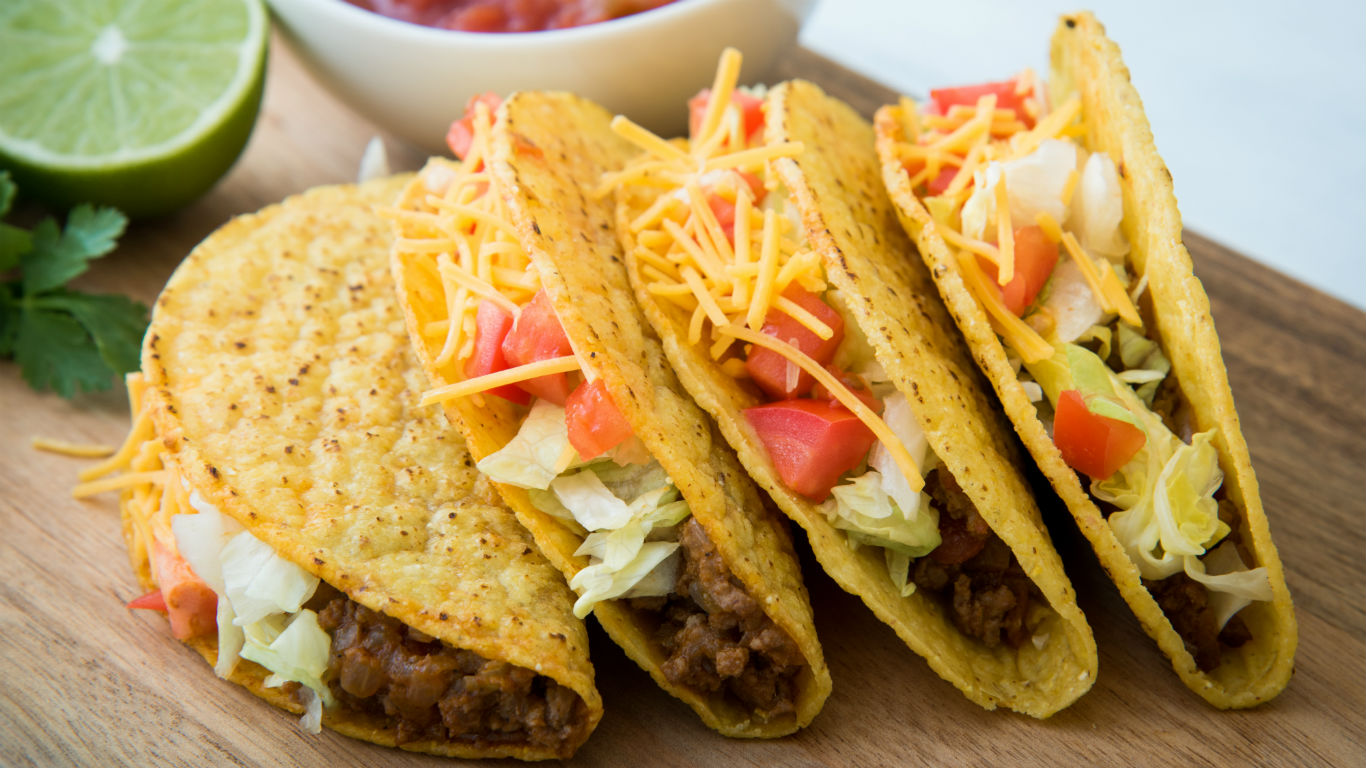
26. Crispy-shell ground beef taco
If you go to Mexico (or one of the countless fantastic taquerias across America) and order a taco, you’ll probably get a soft corn tortilla, filled with meat ranging from carnitas to barbacoa to lengua and simply topped with onion, cilantro, and maybe a little salsa. What you won’t receive is a prefabricated hard-shell corn tortilla filled with seasoned ground beef, lettuce, tomato, and shredded bright orange cheese. Why? Because that’s a distinctly American invention, popularized by fast food chains and at countless family taco nights. When done properly it can be undeniably delicious, but it’s not a taco in its purest sense.
[in-text-ad]
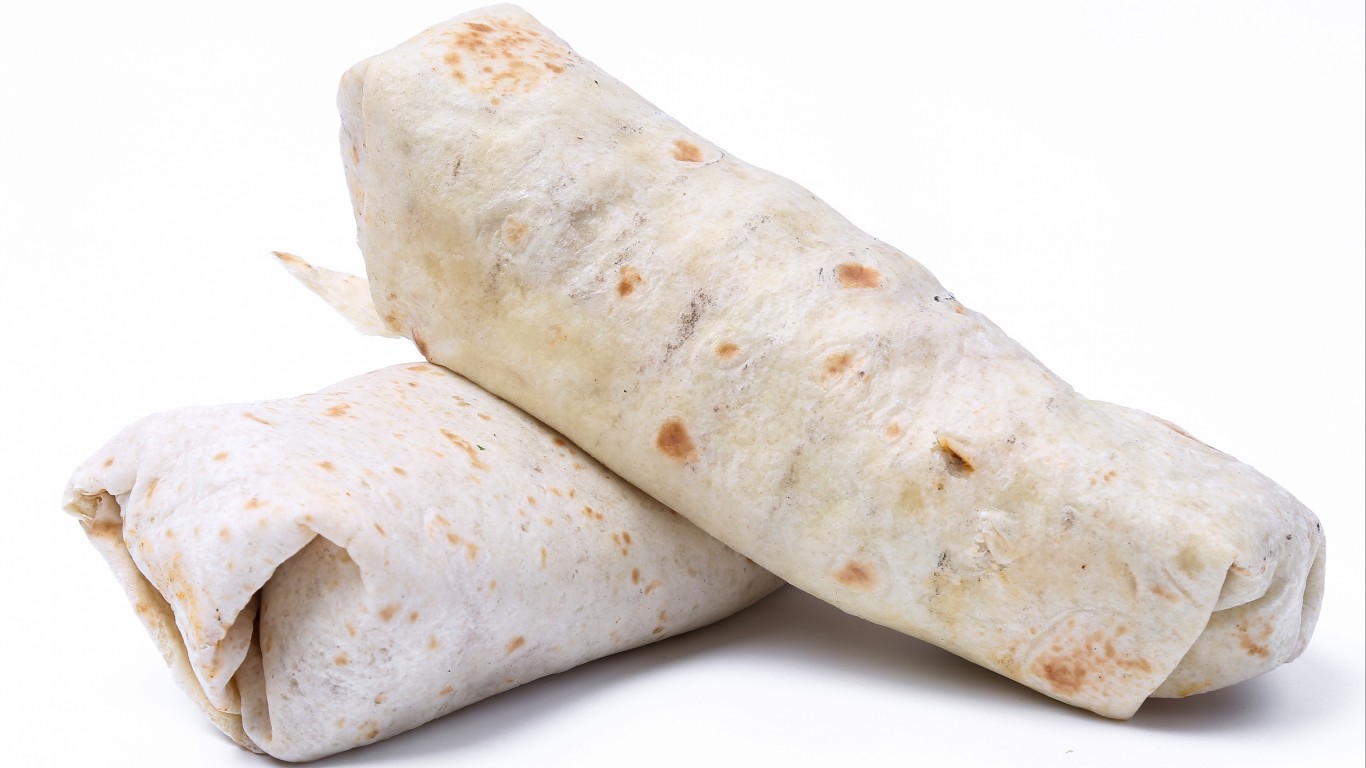
27. Mission burrito
And just like a taco, if you order a burrito in Mexico you probably won’t get what you’re expecting. That’s because the Mission-style burrito, which nowadays is best recognized as what they’re serving up at your local Chipotle, is also an American invention. In Mexico, burritos are usually quite small, and are just flour tortillas rolled up around a couple ingredients, like meat, beans, and chiles (and they’re only really popular in the northern part of the country). The Mission-style burrito, on the other hand, takes a jumbo-size tortilla and fills it with a variety of fillings including meat, beans, rice, cheese, sour cream, onion, and guacamole. It was popularized in San Francisco’s Mission District (hence the name) in the ’60s and ’70s, and many of America’s best burrito joints can still be found in the neighborhood.
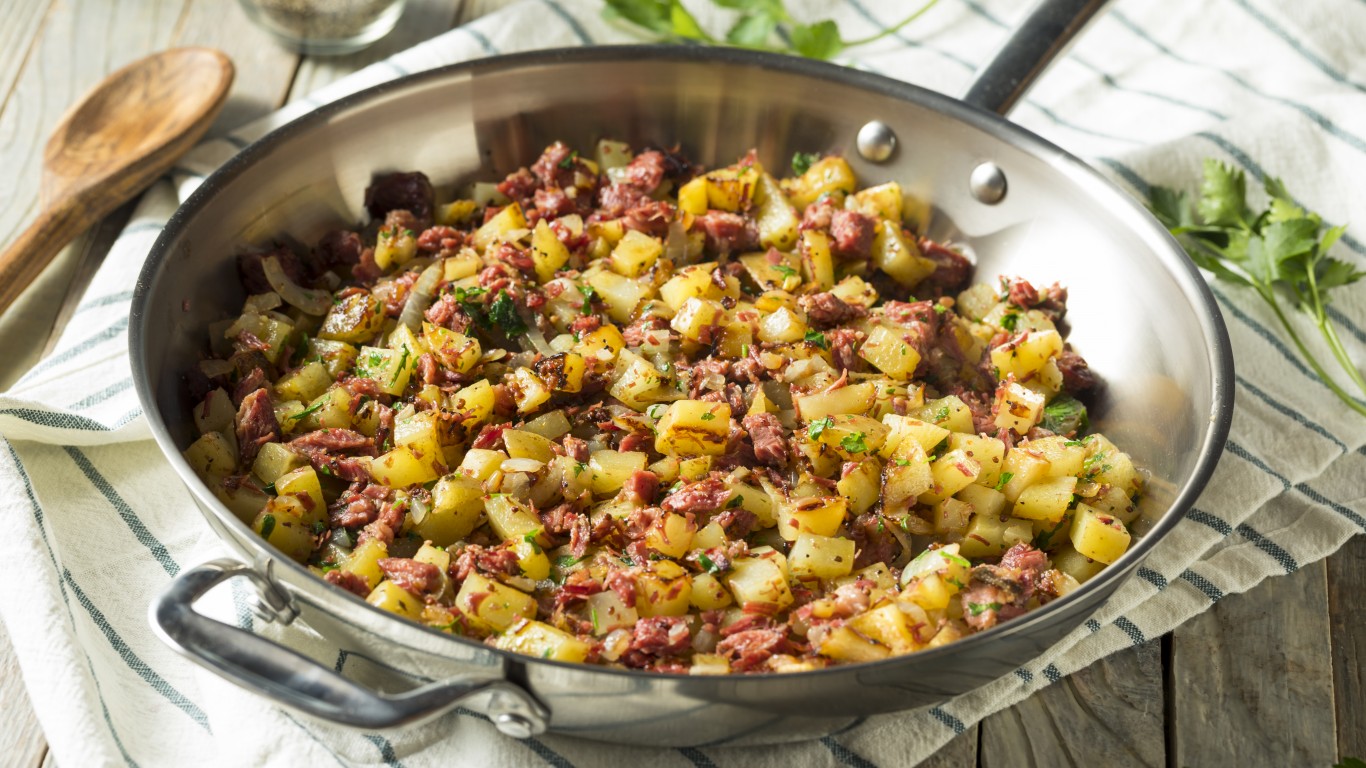
28. Corned beef hash
Hash is a dish made by frying up chopped meat, potatoes, and onions, invented as a smart way to use up leftovers. Corned beef hash is an especially popular style thanks to New England, where the traditional boiled dinner of corned beef, cabbage, potatoes, and onions was once very common. Today, corned beef hash can be the centerpiece of a restaurant’s brunch menu with all homemade components, it can be easily whipped up at home, or it can go straight from the can into the frying pan. Whatever you do, be sure to top yours with a fried egg.

29. Fried chicken
Few dishes are more associated with the South than fried chicken, which was introduced to the region by slaves. In the 20th century, especially after the advent of pressure frying by (Colonel) Harland Sanders sped up the cooking process, it became a fast food staple. Nowadays, there are countless recipes for fried chicken, and restaurants and cooks across the country consider it their signature dish. Whether pan-fried or deep-fried, breaded or battered, or served in a bucket or atop a waffle, we just can’t get enough of it.
[in-text-ad-2]
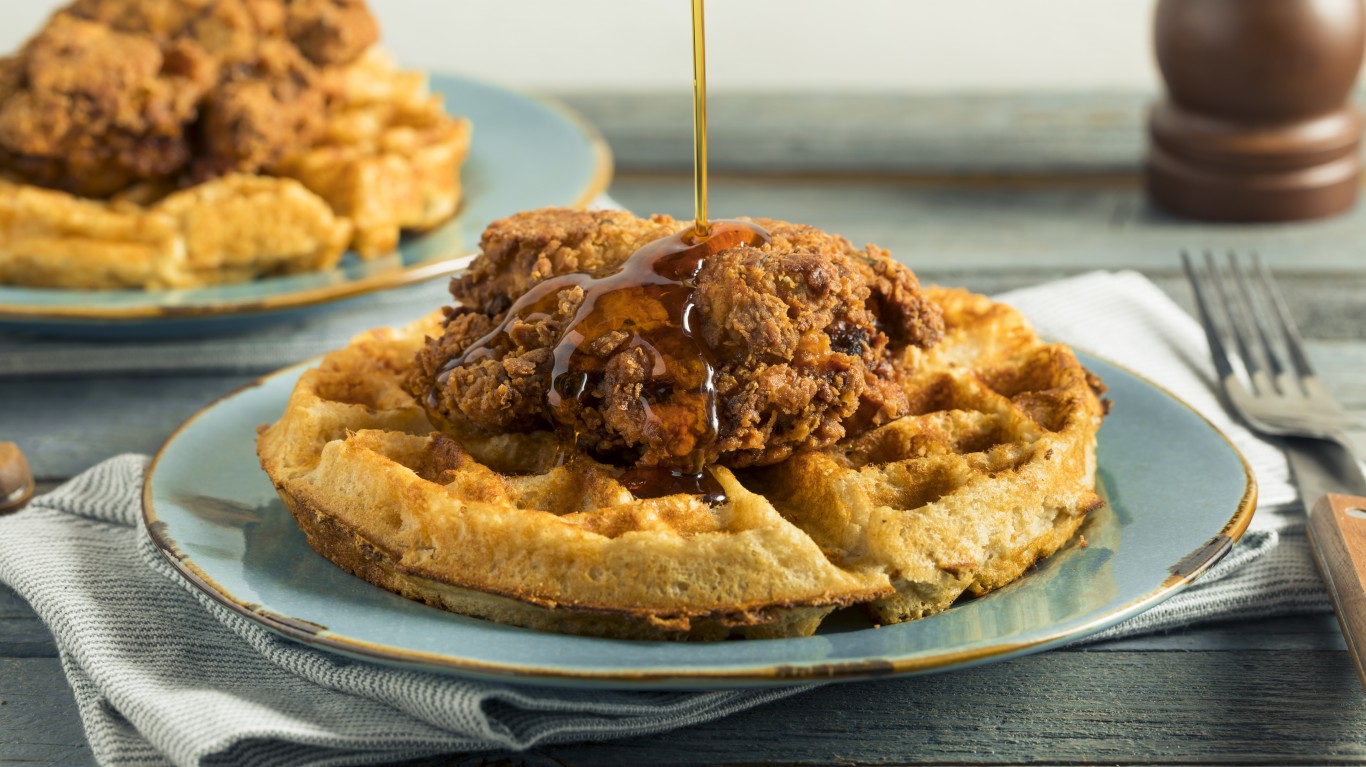
30. Chicken and waffles
Speaking of waffles⦠Chicken and waffles is an increasingly popular method of serving fried chicken these days, thanks to the tantalizing interplay between the crunchy and juicy chicken, the crisp and fluffy waffle, and the sweet maple syrup. The duo was actually popularized in Pennsylvania Dutch country, but it didn’t really take off until it made its way to NYC’s Harlem in the 1930s. It soon became a soul food staple, and it remains a popular dish at soul food restaurants (and increasingly, plenty of other types of restaurants) to this day.
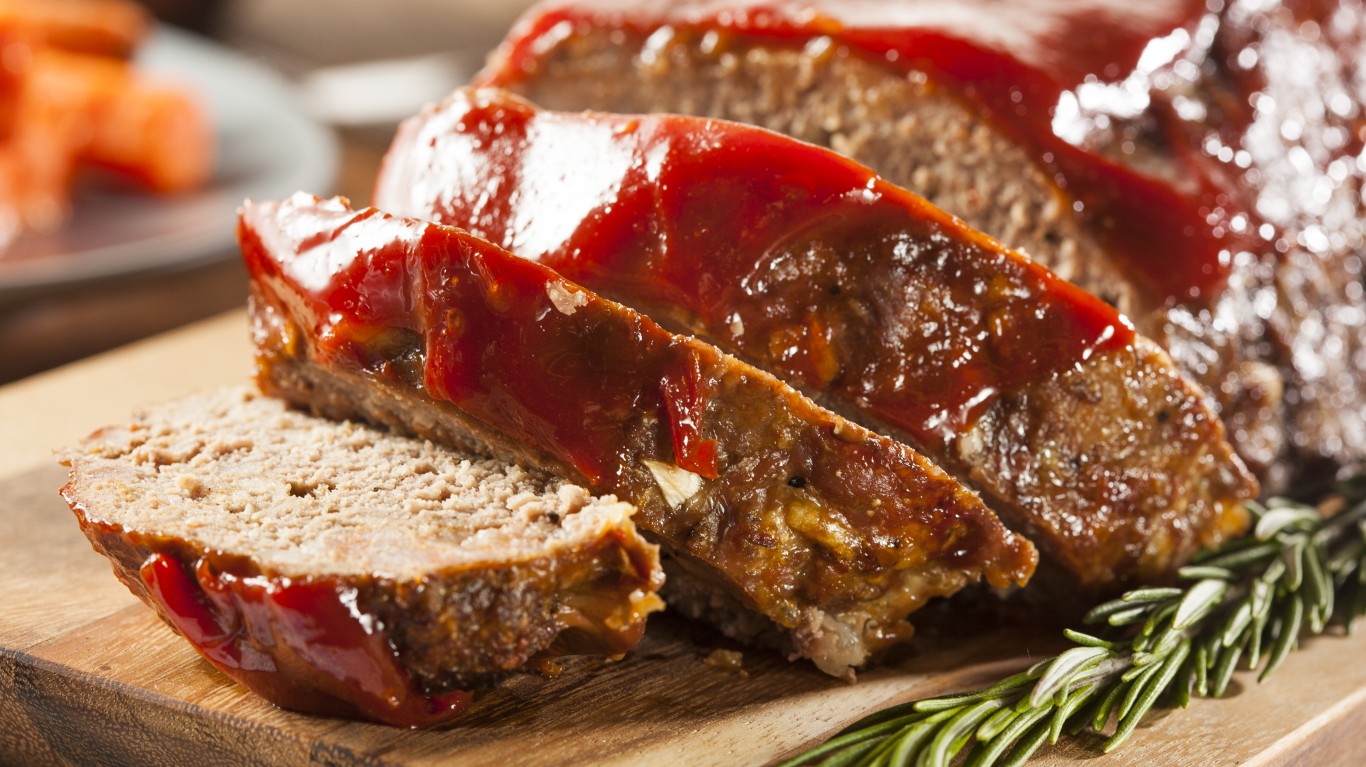
31. Meatloaf
Whether you prefer yours glazed with ketchup or barbecue sauce, doused in gravy, or “frosted” with mashed potatoes, meatloaf is one of those foods that everyone secretly loves, even if they say they don’t. While something like meatloaf has been enjoyed the world over in some form since Ancient Roman times, it didn’t appear in American cookbooks until the late 1800s. It especially caught on during the Depression, as a way to extend inexpensive ground meat with grains, bread, or crackers. It remains a hallmark of home cookery to this day, and leftovers make for a truly great sandwich.
[in-text-ad]
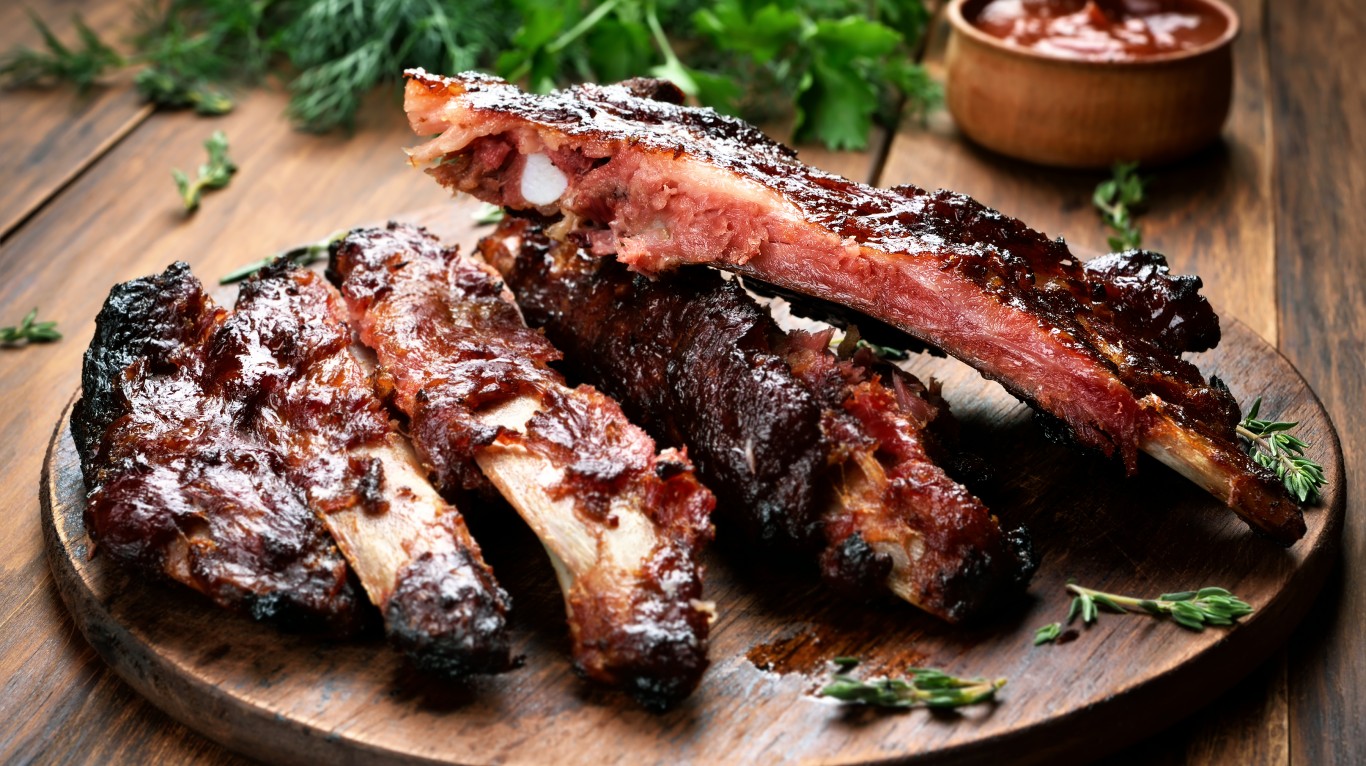
32. Barbecued spare ribs
Along with brisket and pulled pork, ribs are an essential element of American barbecue, and any BBQ joint worth its sauce had better do them well. Racks of ribs are rubbed down with spices and slowly smoked until tender, then sauced and served as either a full rack or half rack. Many home cooks who don’t have access to a smoker make their own by slowly roasting them in the oven or using a pressure cooker. And though the recipe is obviously different, spare ribs are also a signature of Chinese barbecue.
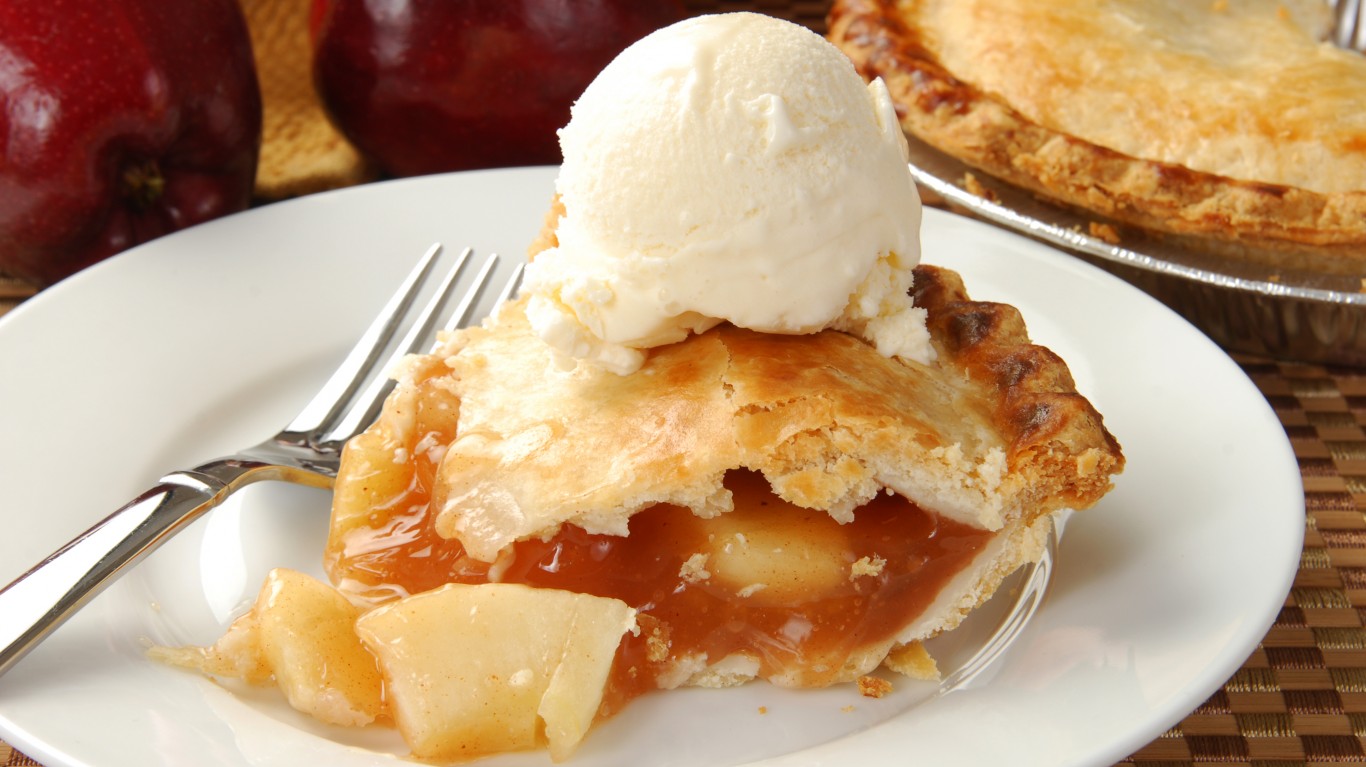
33. Apple pie
If there’s one dish that could be considered the signature American dessert, it would have to be apple pie. What’s more American than apple pie, right? (The dish was brought over by English, Dutch, and Swedish during the 16- and 1700s, but we’ll keep that between us.) Whether it’s topped with a lattice crust or a streusel crumble, served hot or cold, or served a la mode or with a slice of cheddar on top (don’t knock it till you try it!), apple pie is one of those foods we always have a little extra space in our stomach for.
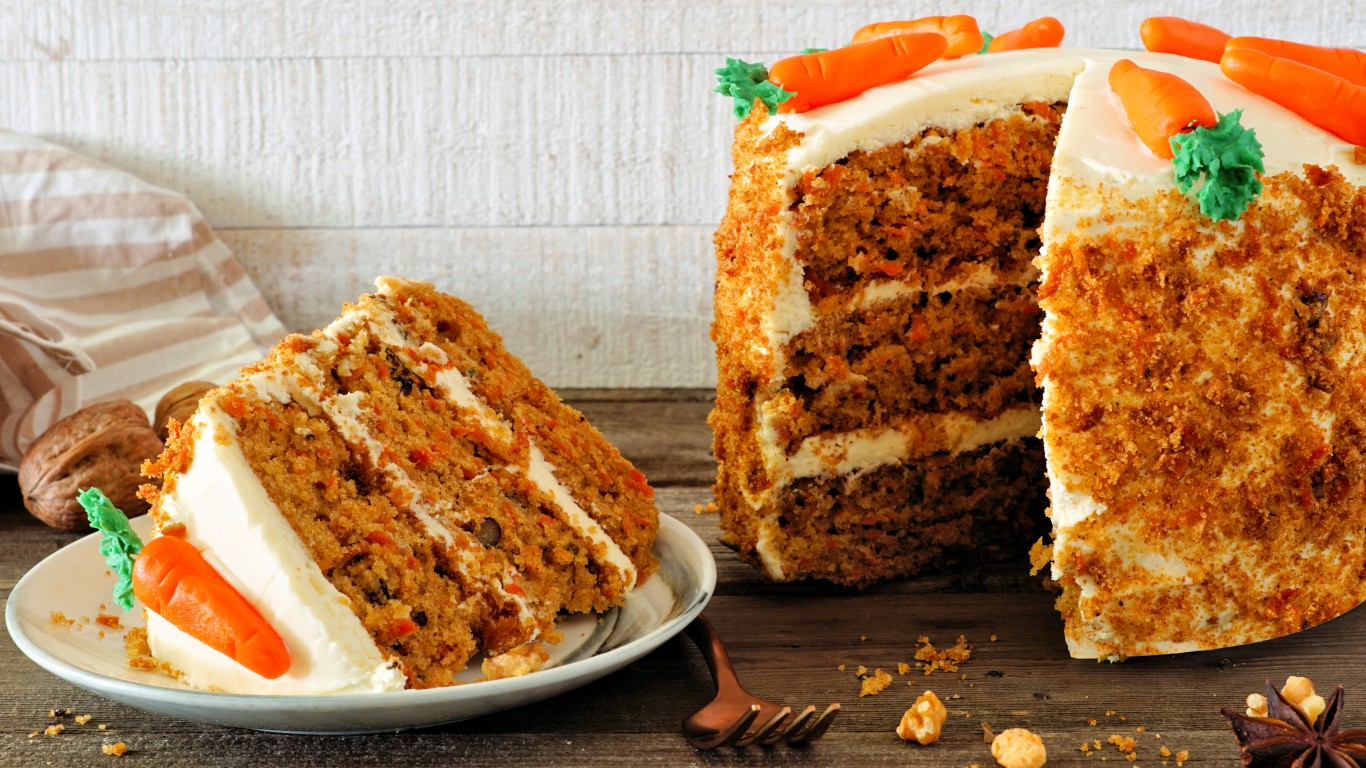
34. Carrot cake
Carrot cake was most likely invented during the Middle Ages, when sweet carrots were used as an alternative to expensive sugar, and its popularity was revived thanks to World War II rationing. The classic recipe was refined over the years, and today most carrot cakes are made with a batter that’s spiced with cinnamon, ginger, and other warm spices (and sometimes made with walnuts and/or raisins along with shredded carrots) and topped with cream cheese frosting. It’s a flavor combo that’s simply iconic, and simply delicious.
[in-text-ad-2]
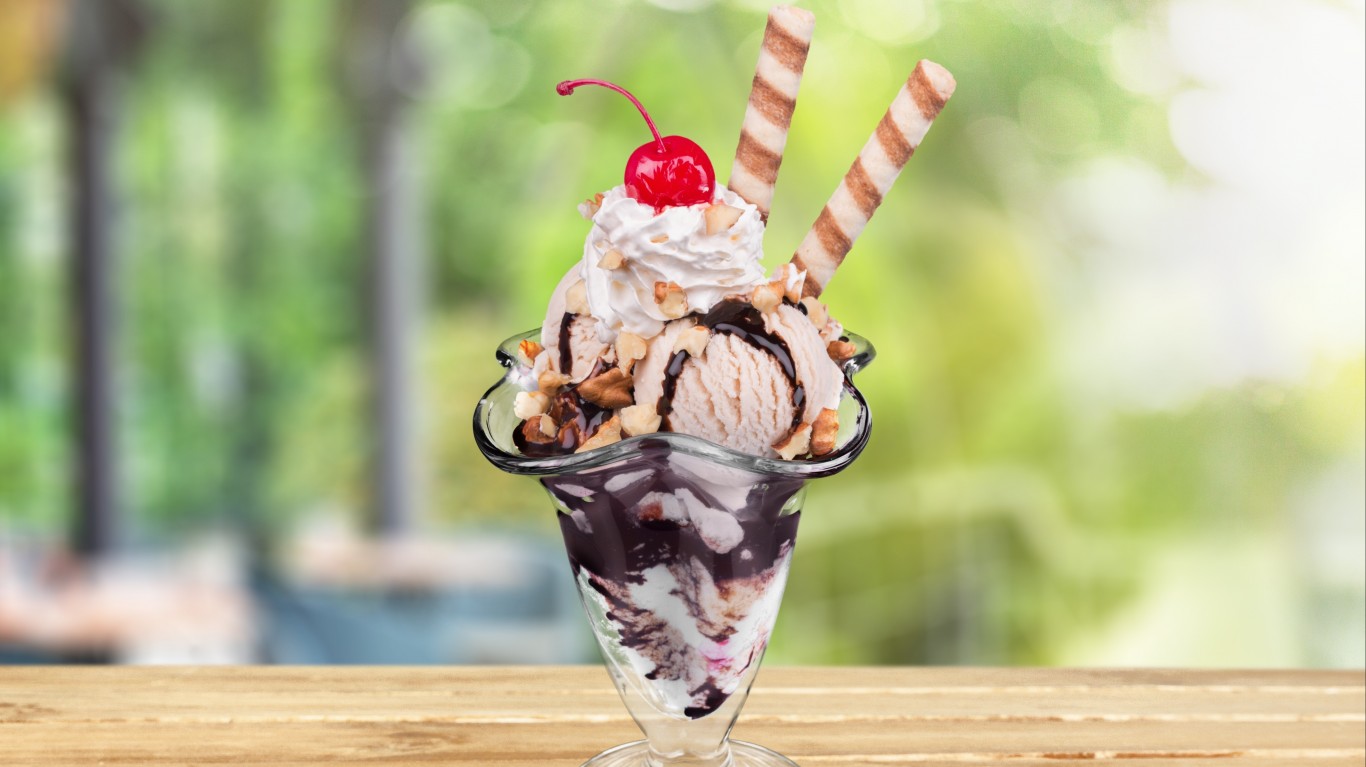
35. Hot fudge sundae
As a kid, any day that involved a hot fudge sundae was automatically a good day. The origins of its name are disputed, but most agree that it derives from “Sunday;” In Two Rivers, Wisconsin, they claim that the inventor at first only served them on Sundays; in Evanston, Illinois, they argue that they were created as “Sunday sodas” after blue laws forbid the sale of ice cream sodas on Sundays; and in Ithaca, New York, they claim that they were invented on a Sunday and first called “Cherry Sundays.” Regardless, the name was eventually changed to sundae, and a legend was born. Since their creation in the late 1800s, the sundae has become an ice cream shop staple, and can be made with any type of ice cream and countless toppings ranging from nuts to fruits to marshmallows. The hot fudge sundae, though, was reportedly invented by C.C. Brown at his ice cream shop in Hollywood in the 1930s.
Thank you for reading! Have some feedback for us?
Contact the 24/7 Wall St. editorial team.
 24/7 Wall St.
24/7 Wall St.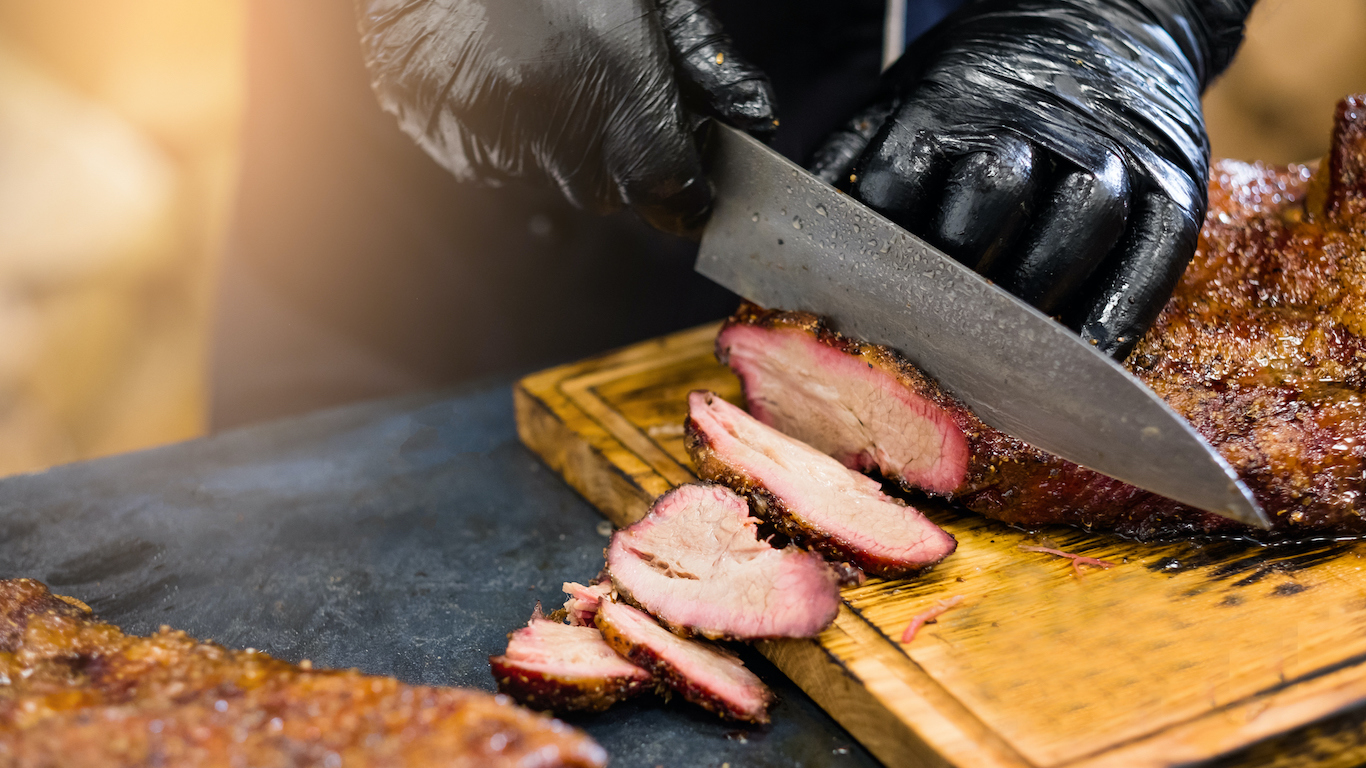 24/7 Wall St.
24/7 Wall St.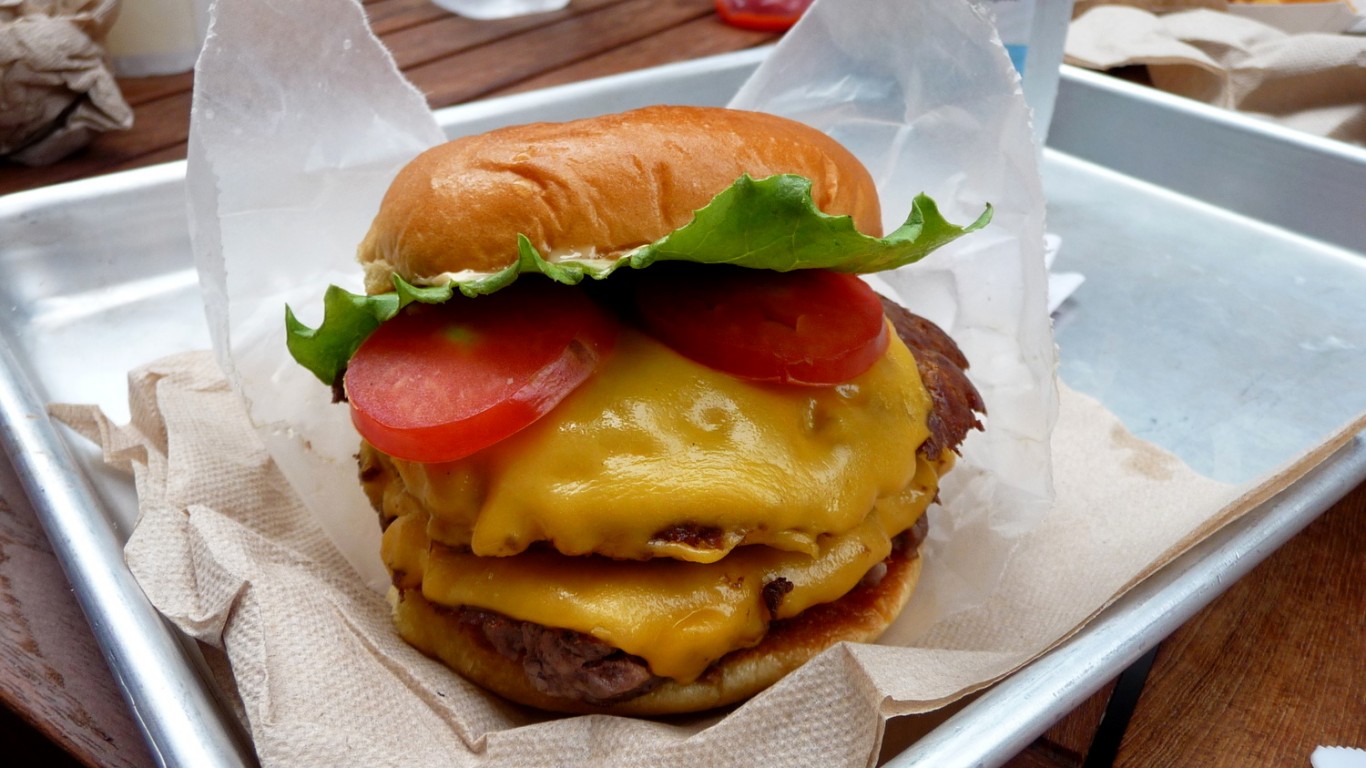 24/7 Wall St.
24/7 Wall St.